Fleurs du Mal Magazine


Or see the index
![]()
James Joyce
(1882-1941)
Counterparts
The bell rang furiously and, when Miss Parker went to the tube, a furious voice called out in a piercing North of Ireland accent:
“Send Farrington here!”
Miss Parker returned to her machine, saying to a man who was writing at a desk:
“Mr. Alleyne wants you upstairs.”
The man muttered “Blast him!” under his breath and pushed back his chair to stand up. When he stood up he was tall and of great bulk. He had a hanging face, dark wine-coloured, with fair eyebrows and moustache: his eyes bulged forward slightly and the whites of them were dirty. He lifted up the counter and, passing by the clients, went out of the office with a heavy step.
He went heavily upstairs until he came to the second landing, where a door bore a brass plate with the inscription Mr. Alleyne. Here he halted, puffing with labour and vexation, and knocked. The shrill voice cried:
“Come in!”
The man entered Mr. Alleyne’s room. Simultaneously Mr. Alleyne, a little man wearing gold-rimmed glasses on a cleanshaven face, shot his head up over a pile of documents. The head itself was so pink and hairless it seemed like a large egg reposing on the papers. Mr. Alleyne did not lose a moment:
“Farrington? What is the meaning of this? Why have I always to complain of you? May I ask you why you haven’t made a copy of that contract between Bodley and Kirwan? I told you it must be ready by four o’clock.”
“But Mr. Shelley said, sir—-“
“Mr. Shelley said, sir …. Kindly attend to what I say and not to what Mr. Shelley says, sir. You have always some excuse or another for shirking work. Let me tell you that if the contract is not copied before this evening I’ll lay the matter before Mr. Crosbie…. Do you hear me now?”
“Yes, sir.”
“Do you hear me now?… Ay and another little matter! I might as well be talking to the wall as talking to you. Understand once for all that you get a half an hour for your lunch and not an hour and a half. How many courses do you want, I’d like to know…. Do you mind me now?”
“Yes, sir.”
Mr. Alleyne bent his head again upon his pile of papers. The man stared fixedly at the polished skull which directed the affairs of Crosbie & Alleyne, gauging its fragility. A spasm of rage gripped his throat for a few moments and then passed, leaving after it a sharp sensation of thirst. The man recognised the sensation and felt that he must have a good night’s drinking. The middle of the month was passed and, if he could get the copy done in time, Mr. Alleyne might give him an order on the cashier. He stood still, gazing fixedly at the head upon the pile of papers. Suddenly Mr. Alleyne began to upset all the papers, searching for something. Then, as if he had been unaware of the man’s presence till that moment, he shot up his head again, saying:
“Eh? Are you going to stand there all day? Upon my word, Farrington, you take things easy!”
“I was waiting to see…”
“Very good, you needn’t wait to see. Go downstairs and do your work.”
The man walked heavily towards the door and, as he went out of the room, he heard Mr. Alleyne cry after him that if the contract was not copied by evening Mr. Crosbie would hear of the matter.
He returned to his desk in the lower office and counted the sheets which remained to be copied. He took up his pen and dipped it in the ink but he continued to stare stupidly at the last words he had written: In no case shall the said Bernard Bodley be… The evening was falling and in a few minutes they would be lighting the gas: then he could write. He felt that he must slake the thirst in his throat. He stood up from his desk and, lifting the counter as before, passed out of the office. As he was passing out the chief clerk looked at him inquiringly.
“It’s all right, Mr. Shelley,” said the man, pointing with his finger to indicate the objective of his journey.
The chief clerk glanced at the hat-rack, but, seeing the row complete, offered no remark. As soon as he was on the landing the man pulled a shepherd’s plaid cap out of his pocket, put it on his head and ran quickly down the rickety stairs. From the street door he walked on furtively on the inner side of the path towards the corner and all at once dived into a doorway. He was now safe in the dark snug of O’Neill’s shop, and filling up the little window that looked into the bar with his inflamed face, the colour of dark wine or dark meat, he called out:
“Here, Pat, give us a g.p.. like a good fellow.”
The curate brought him a glass of plain porter. The man drank it at a gulp and asked for a caraway seed. He put his penny on the counter and, leaving the curate to grope for it in the gloom, retreated out of the snug as furtively as he had entered it.
Darkness, accompanied by a thick fog, was gaining upon the dusk of February and the lamps in Eustace Street had been lit. The man went up by the houses until he reached the door of the office, wondering whether he could finish his copy in time. On the stairs a moist pungent odour of perfumes saluted his nose: evidently Miss Delacour had come while he was out in O’Neill’s. He crammed his cap back again into his pocket and re-entered the office, assuming an air of absentmindedness.
“Mr. Alleyne has been calling for you,” said the chief clerk severely. “Where were you?”
The man glanced at the two clients who were standing at the counter as if to intimate that their presence prevented him from answering. As the clients were both male the chief clerk allowed himself a laugh.
“I know that game,” he said. “Five times in one day is a little bit… Well, you better look sharp and get a copy of our correspondence in the Delacour case for Mr. Alleyne.”
This address in the presence of the public, his run upstairs and the porter he had gulped down so hastily confused the man and, as he sat down at his desk to get what was required, he realised how hopeless was the task of finishing his copy of the contract before half past five. The dark damp night was coming and he longed to spend it in the bars, drinking with his friends amid the glare of gas and the clatter of glasses. He got out the Delacour correspondence and passed out of the office. He hoped Mr. Alleyne would not discover that the last two letters were missing.
The moist pungent perfume lay all the way up to Mr. Alleyne’s room. Miss Delacour was a middle-aged woman of Jewish appearance. Mr. Alleyne was said to be sweet on her or on her money. She came to the office often and stayed a long time when she came. She was sitting beside his desk now in an aroma of perfumes, smoothing the handle of her umbrella and nodding the great black feather in her hat. Mr. Alleyne had swivelled his chair round to face her and thrown his right foot jauntily upon his left knee. The man put the correspondence on the desk and bowed respectfully but neither Mr. Alleyne nor Miss Delacour took any notice of his bow. Mr. Alleyne tapped a finger on the correspondence and then flicked it towards him as if to say: “That’s all right: you can go.”
The man returned to the lower office and sat down again at his desk. He stared intently at the incomplete phrase: In no case shall the said Bernard Bodley be… and thought how strange it was that the last three words began with the same letter. The chief clerk began to hurry Miss Parker, saying she would never have the letters typed in time for post. The man listened to the clicking of the machine for a few minutes and then set to work to finish his copy. But his head was not clear and his mind wandered away to the glare and rattle of the public-house. It was a night for hot punches. He struggled on with his copy, but when the clock struck five he had still fourteen pages to write. Blast it! He couldn’t finish it in time. He longed to execrate aloud, to bring his fist down on something violently. He was so enraged that he wrote Bernard Bernard instead of Bernard Bodley and had to begin again on a clean sheet.
He felt strong enough to clear out the whole office singlehanded. His body ached to do something, to rush out and revel in violence. All the indignities of his life enraged him…. Could he ask the cashier privately for an advance? No, the cashier was no good, no damn good: he wouldn’t give an advance…. He knew where he would meet the boys: Leonard and O’Halloran and Nosey Flynn. The barometer of his emotional nature was set for a spell of riot.
His imagination had so abstracted him that his name was called twice before he answered. Mr. Alleyne and Miss Delacour were standing outside the counter and all the clerks had turn round in anticipation of something. The man got up from his desk. Mr. Alleyne began a tirade of abuse, saying that two letters were missing. The man answered that he knew nothing about them, that he had made a faithful copy. The tirade continued: it was so bitter and violent that the man could hardly restrain his fist from descending upon the head of the manikin before him:
“I know nothing about any other two letters,” he said stupidly.
“You–know–nothing. Of course you know nothing,” said Mr. Alleyne. “Tell me,” he added, glancing first for approval to the lady beside him, “do you take me for a fool? Do you think me an utter fool?”
The man glanced from the lady’s face to the little egg-shaped head and back again; and, almost before he was aware of it, his tongue had found a felicitous moment:
“I don’t think, sir,” he said, “that that’s a fair question to put to me.”
There was a pause in the very breathing of the clerks. Everyone was astounded (the author of the witticism no less than his neighbours) and Miss Delacour, who was a stout amiable person, began to smile broadly. Mr. Alleyne flushed to the hue of a wild rose and his mouth twitched with a dwarf s passion. He shook his fist in the man’s face till it seemed to vibrate like the knob of some electric machine:
“You impertinent ruffian! You impertinent ruffian! I’ll make short work of you! Wait till you see! You’ll apologise to me for your impertinence or you’ll quit the office instanter! You’ll quit this, I’m telling you, or you’ll apologise to me!”
He stood in a doorway opposite the office watching to see if the cashier would come out alone. All the clerks passed out and finally the cashier came out with the chief clerk. It was no use trying to say a word to him when he was with the chief clerk. The man felt that his position was bad enough. He had been obliged to offer an abject apology to Mr. Alleyne for his impertinence but he knew what a hornet’s nest the office would be for him. He could remember the way in which Mr. Alleyne had hounded little Peake out of the office in order to make room for his own nephew. He felt savage and thirsty and revengeful, annoyed with himself and with everyone else. Mr. Alleyne would never give him an hour’s rest; his life would be a hell to him. He had made a proper fool of himself this time. Could he not keep his tongue in his cheek? But they had never pulled together from the first, he and Mr. Alleyne, ever since the day Mr. Alleyne had overheard him mimicking his North of Ireland accent to amuse Higgins and Miss Parker: that had been the beginning of it. He might have tried Higgins for the money, but sure Higgins never had anything for himself. A man with two establishments to keep up, of course he couldn’t….
He felt his great body again aching for the comfort of the public-house. The fog had begun to chill him and he wondered could he touch Pat in O’Neill’s. He could not touch him for more than a bob — and a bob was no use. Yet he must get money somewhere or other: he had spent his last penny for the g.p. and soon it would be too late for getting money anywhere. Suddenly, as he was fingering his watch-chain, he thought of Terry Kelly’s pawn-office in Fleet Street. That was the dart! Why didn’t he think of it sooner?
He went through the narrow alley of Temple Bar quickly, muttering to himself that they could all go to hell because he was going to have a good night of it. The clerk in Terry Kelly’s said A crown! but the consignor held out for six shillings; and in the end the six shillings was allowed him literally. He came out of the pawn-office joyfully, making a little cylinder, of the coins between his thumb and fingers. In Westmoreland Street the footpaths were crowded with young men and women returning from business and ragged urchins ran here and there yelling out the names of the evening editions. The man passed through the crowd, looking on the spectacle generally with proud satisfaction and staring masterfully at the office-girls. His head was full of the noises of tram- gongs and swishing trolleys and his nose already sniffed the curling fumes punch. As he walked on he preconsidered the terms in which he would narrate the incident to the boys:
“So, I just looked at him — coolly, you know, and looked at her. Then I looked back at him again — taking my time, you know. ‘I don’t think that that’s a fair question to put to me,’ says I.”
Nosey Flynn was sitting up in his usual corner of Davy Byrne’s and, when he heard the story, he stood Farrington a half-one, saying it was as smart a thing as ever he heard. Farrington stood a drink in his turn. After a while O’Halloran and Paddy Leonard came in and the story was repeated to them. O’Halloran stood tailors of malt, hot, all round and told the story of the retort he had made to the chief clerk when he was in Callan’s of Fownes’s Street; but, as the retort was after the manner of the liberal shepherds in the eclogues, he had to admit that it was not as clever as Farrington’s retort. At this Farrington told the boys to polish off that and have another.
Just as they were naming their poisons who should come in but Higgins! Of course he had to join in with the others. The men asked him to give his version of it, and he did so with great vivacity for the sight of five small hot whiskies was very exhilarating. Everyone roared laughing when he showed the way in which Mr. Alleyne shook his fist in Farrington’s face. Then he imitated Farrington, saying, “And here was my nabs, as cool as you please,” while Farrington looked at the company out of his heavy dirty eyes, smiling and at times drawing forth stray drops of liquor from his moustache with the aid of his lower lip.
When that round was over there was a pause. O’Halloran had money but neither of the other two seemed to have any; so the whole party left the shop somewhat regretfully. At the corner of Duke Street Higgins and Nosey Flynn bevelled off to the left while the other three turned back towards the city. Rain was drizzling down on the cold streets and, when they reached the Ballast Office, Farrington suggested the Scotch House. The bar was full of men and loud with the noise of tongues and glasses. The three men pushed past the whining matchsellers at the door and formed a little party at the corner of the counter. They began to exchange stories. Leonard introduced them to a young fellow named Weathers who was performing at the Tivoli as an acrobat and knockabout artiste. Farrington stood a drink all round. Weathers said he would take a small Irish and Apollinaris. Farrington, who had definite notions of what was what, asked the boys would they have an Apollinaris too; but the boys told Tim to make theirs hot. The talk became theatrical. O’Halloran stood a round and then Farrington stood another round, Weathers protesting that the hospitality was too Irish. He promised to get them in behind the scenes and introduce them to some nice girls. O’Halloran said that he and Leonard would go, but that Farrington wouldn’t go because he was a married man; and Farrington’s heavy dirty eyes leered at the company in token that he understood he was being chaffed. Weathers made them all have just one little tincture at his expense and promised to meet them later on at Mulligan’s in Poolbeg Street.
When the Scotch House closed they went round to Mulligan’s. They went into the parlour at the back and O’Halloran ordered small hot specials all round. They were all beginning to feel mellow. Farrington was just standing another round when Weathers came back. Much to Farrington’s relief he drank a glass of bitter this time. Funds were getting low but they had enough to keep them going. Presently two young women with big hats and a young man in a check suit came in and sat at a table close by. Weathers saluted them and told the company that they were out of the Tivoli. Farrington’s eyes wandered at every moment in the direction of one of the young women. There was something striking in her appearance. An immense scarf of peacock-blue muslin was wound round her hat and knotted in a great bow under her chin; and she wore bright yellow gloves, reaching to the elbow. Farrington gazed admiringly at the plump arm which she moved very often and with much grace; and when, after a little time, she answered his gaze he admired still more her large dark brown eyes. The oblique staring expression in them fascinated him. She glanced at him once or twice and, when the party was leaving the room, she brushed against his chair and said “O, pardon!” in a London accent. He watched her leave the room in the hope that she would look back at him, but he was disappointed. He cursed his want of money and cursed all the rounds he had stood, particularly all the whiskies and Apolinaris which he had stood to Weathers. If there was one thing that he hated it was a sponge. He was so angry that he lost count of the conversation of his friends.
When Paddy Leonard called him he found that they were talking about feats of strength. Weathers was showing his biceps muscle to the company and boasting so much that the other two had called on Farrington to uphold the national honour. Farrington pulled up his sleeve accordingly and showed his biceps muscle to the company. The two arms were examined and compared and finally it was agreed to have a trial of strength. The table was cleared and the two men rested their elbows on it, clasping hands. When Paddy Leonard said “Go!” each was to try to bring down the other’s hand on to the table. Farrington looked very serious and determined.
The trial began. After about thirty seconds Weathers brought his opponent’s hand slowly down on to the table. Farrington’s dark wine-coloured face flushed darker still with anger and humiliation at having been defeated by such a stripling.
“You’re not to put the weight of your body behind it. Play fair,” he said.
“Who’s not playing fair?” said the other.
“Come on again. The two best out of three.”
The trial began again. The veins stood out on Farrington’s forehead, and the pallor of Weathers’ complexion changed to peony. Their hands and arms trembled under the stress. After a long struggle Weathers again brought his opponent’s hand slowly on to the table. There was a murmur of applause from the spectators. The curate, who was standing beside the table, nodded his red head towards the victor and said with stupid familiarity:
“Ah! that’s the knack!”
“What the hell do you know about it?” said Farrington fiercely, turning on the man. “What do you put in your gab for?”
“Sh, sh!” said O’Halloran, observing the violent expression of Farrington’s face. “Pony up, boys. We’ll have just one little smahan more and then we’ll be off.”
A very sullen-faced man stood at the corner of O’Connell Bridge waiting for the little Sandymount tram to take him home. He was full of smouldering anger and revengefulness. He felt humiliated and discontented; he did not even feel drunk; and he had only twopence in his pocket. He cursed everything. He had done for himself in the office, pawned his watch, spent all his money; and he had not even got drunk. He began to feel thirsty again and he longed to be back again in the hot reeking public-house. He had lost his reputation as a strong man, having been defeated twice by a mere boy. His heart swelled with fury and, when he thought of the woman in the big hat who had brushed against him and said Pardon! his fury nearly choked him.
His tram let him down at Shelbourne Road and he steered his great body along in the shadow of the wall of the barracks. He loathed returning to his home. When he went in by the side- door he found the kitchen empty and the kitchen fire nearly out. He bawled upstairs:
“Ada! Ada!”
His wife was a little sharp-faced woman who bullied her husband when he was sober and was bullied by him when he was drunk. They had five children. A little boy came running down the stairs.
“Who is that?” said the man, peering through the darkness.
“Me, pa.”
“Who are you? Charlie?”
“No, pa. Tom.”
“Where’s your mother?”
“She’s out at the chapel.”
“That’s right…. Did she think of leaving any dinner for me?”
“Yes, pa. I –“
“Light the lamp. What do you mean by having the place in darkness? Are the other children in bed?”
The man sat down heavily on one of the chairs while the little boy lit the lamp. He began to mimic his son’s flat accent, saying half to himself: “At the chapel. At the chapel, if you please!” When the lamp was lit he banged his fist on the table and shouted:
“What’s for my dinner?”
“I’m going… to cook it, pa,” said the little boy.
The man jumped up furiously and pointed to the fire.
“On that fire! You let the fire out! By God, I’ll teach you to do that again!”
He took a step to the door and seized the walking-stick which was standing behind it.
“I’ll teach you to let the fire out!” he said, rolling up his sleeve in order to give his arm free play.
The little boy cried “O, pa!” and ran whimpering round the table, but the man followed him and caught him by the coat. The little boy looked about him wildly but, seeing no way of escape, fell upon his knees.
“Now, you’ll let the fire out the next time!” said the man striking at him vigorously with the stick. “Take that, you little whelp!”
The boy uttered a squeal of pain as the stick cut his thigh. He clasped his hands together in the air and his voice shook with fright.
“O, pa!” he cried. “Don’t beat me, pa! And I’ll… I’ll say a Hail Mary for you…. I’ll say a Hail Mary for you, pa, if you don’t beat me…. I’ll say a Hail Mary….”
James Joyce stories
fleursdumal.nl magazine
More in: Joyce, James, Joyce, James
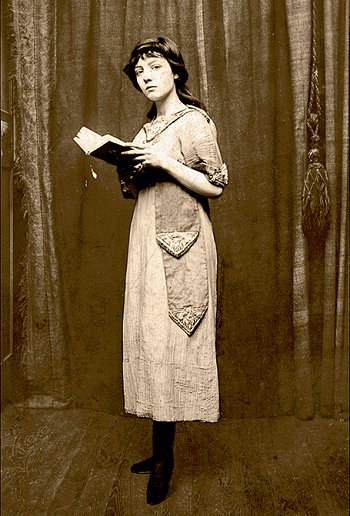
Mireille Havet
(1898-1932)
À un très petit enfant
Pendant la Guerre
Le vent qui souffle ! Tu ne t’en occupes pas.
La guerre qui souffle ! Tu ne t’en occupes pas.
Peu à peu tu apprendras
que sur la terre il y a des orages
et la pluie drue pendant des jours.
Peu à peu tu apprendras
que la haine existe vivace et ardente :
Et le désir de tuer des hommes innocents
parfaitement inconnus de nom et de visage
…. qui auraient pu être des frères
si on avait voulu !
Ô Toi ! Né pendant la guerre
la plus folle ! la plus absolue.
Toi ! spectateur impassible et incompréhensif
qui ne jugeras que bien plus tard,
quand seront éteintes les flammes
et balayées les cendres.
Toi ! qui viens pour reconstruire
avec toute la tendresse de ton regard
bien disposé et sans méfiance,
avec tes mains si douces…. et roses
où peu à peu se dessineront
les grandes lignes de l’existence.
Te voici envoyé vers nous,
avec la perspective de ton enfance
inconsciente et échevelée,
pendant que se finira la guerre démente
et que nous planterons nos croix !
Tu ne viens, ni pour pleurer
ni pour souffrir
en quoi que ce soit, du malheur de notre année !
Tu viens, Promesse d’Avenir,
pour établir et contempler la paix !
Ô mon petit Enfant,
pour l’instant, dans le soleil,
tu joues avec le sable de cette terre
pour laquelle le sang coule
incompressible depuis des mois !
Et tout à l’heure, quand le soleil dormira
sur nos chantiers de morts,
tu souriras à la lumière de ta veilleuse
entre les voiles de ton berceau blanc.
Tu ne sais rien. Ton âme est close.
Tu es la chrysalide du lendemain.
Et je te regarde, affolée par tant d’innocence
et de certitude.
Ta tâche n’est pas la plus douce.
Constructeur parmi les décombres :
Il te faudra aller sans défaillance,
ne pas croire que la vie est mauvaise
parce que la mort fut un instant
la plus forte !
Tout reprendra avec tes soins.
Génération de vie laborieuse et fervente
après notre génération de sacrifices et de croix
— Efflorescence merveilleuse sur nos morts. —
Le soleil se refera d’une clarté éblouissante
et le blé sera haut dans les champs
avec des cigales dedans.
Des maisons blanches seront bâties
au bord des rivières :
au bord de la Meuse, de la Marne, du Rhin !
Et vous saurez être heureux encore
d’un bonheur neuf et vigoureux
comme votre sang d’enfants nés pendant la guerre.
Mais en ce moment : Tu dors,
ignorant la terre, le vent, la lutte ;
tes yeux fermés abritent le secret
de ton âme
qui est bien la plus forte…
avec son rôle à venir
et l’inconscience de son rêve actuel
où se mire l’éternité.
La Maison dans l’œil du chat
Paris, éditions Georges Crès & Cie, 1917
Mireille Havet poetry
fleursdumal.nl magazine
More in: Archive G-H, Havet, Mireille, Mireille Havet
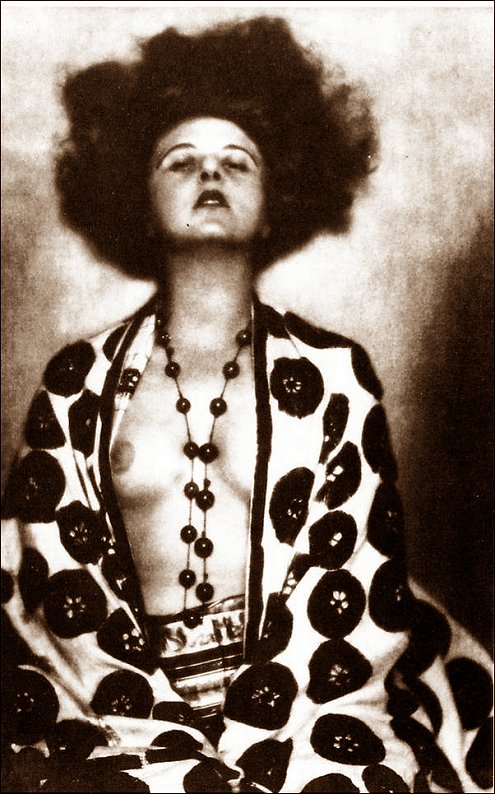
ANITA BERBER
(1899-1928)
O r c h i d e e n
Ich kam in einen Garten
Der Garten war voll von Orchideen
So voll so voll und schwer
Es blühte und lebte und bebte
Ich kam nicht durch die süßen Verschlingungen
Ich liebe sie so wahnsinnig
Für mich sind sie wie Frauen und Knaben –
Ich küsste und koste jede bis zum Schluss
Alle alle starben an meinen roten Lippen
an meinen Händen
an meiner Geschlechtslosigkeit
Die doch alle Geschlechter in sich hat
Ich bin blass wie Mondsilber
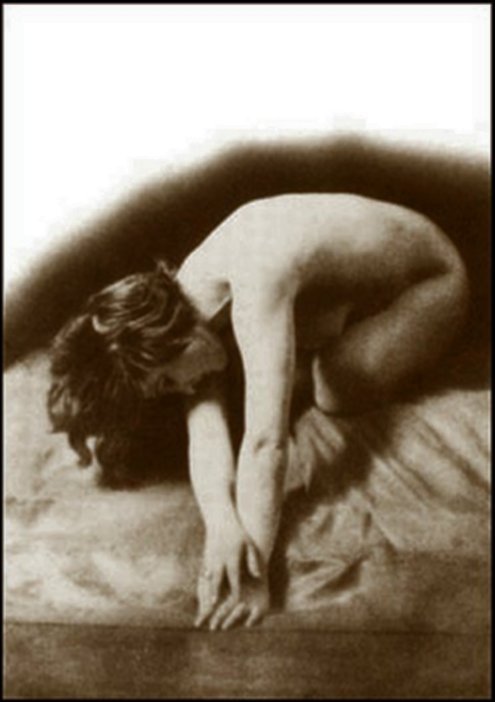
Anita Berber Gedichte
fleursdumal.nl magazine
More in: Anita Berber, Anita Berber, Berber, Anita, DANCE & PERFORMANCE
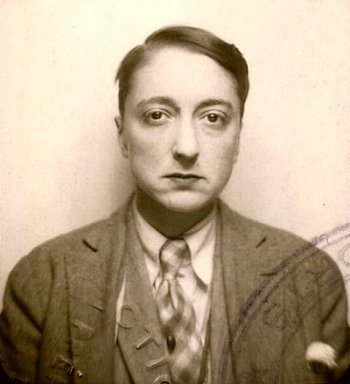
Mireille Havet
(1898-1932)
Arlequin
Mon petit Arlequin
si triste sur le divan
dans la journée molle et que creuse l’orage
aux labours du printemps
tu as chu comme une feuille balancée
pétale détachée qui s’envole
En culotte de soie de toutes couleurs
tes jambes fines en lignes coupées
par les ramages
voyant paysage d’une féerie
de mauvais aloi
où les pommes ont des yeux
et les oiseaux trois pattes
Tu étales dans l’argenterie d’un crépuscule
tout balancé de pluie et d’arrosage
ta souplesse infernale
de sauts périlleux et de scandales
Arlequin mon petit camarade
aux gestes de pantin
qui donc aujourd’hui a tenu
la ficelle de ta belle âme
qui donc a tiré l’élastique de tes quatre membres
que je te vois si pâle et si défait
dans ce costume
qui appelle la bâtonnade
d’un pierrot ridicule
Les jardins ont versé leurs odeurs
sur la route
toute une procession de marronniers
en fleurs
de lilas doubles et de tulipes
quelqu’hirondelle basse écorcha ses ailes
au rosier
et l’orage s’est ouvert
ronronnant troupeau d’abeilles
au ciel électrique de lumière
Alors
abrités par ta maison claire
et mariés d’avance sous le joug diluvien
de l’averse
nous avons cherché
toi familier des planches
et des ramages et des fards
et moi voyageur prodigue au mouchoir
à carreaux faisant mon tour de France
la double douceur de nos chairs nerveuses
illuminées par la saison nouvelle
ses aubes claires et ses rossignols
j’entendais ruisseler les gouttières
et s’abreuver la terre molle
où germent les graines potagères
j’entendais rabattus par le vent
les volets claquer au balcon
et ces intermittences de tonnerre
Longtemps je garderai aux doigts
le souvenir de ta culotte soyeuse
je te cherchais à travers
l’arc-en-ciel
et l’odeur des géraniums
mon petit frère perdu dans les mascarades
et les confettis
mon petit dévoyé de l’école
que faisons-nous
Et pourquoi pas plutôt l’atlas ouvert
sur nos genoux
ou bien les rois de France
Apprendre enfin pour devenir des hommes
Ah ! tu es pris sous moi pris
nous nous entrouvrons sur le néant
du monde
Voilà que chancelle le masque de tes yeux
ta bouche trop rouge
où j’ai mordu l’admirable forme
sa lampe à la main
Arlequin est à la fenêtre
son profil ausculte la nuit
la douteuse lumière pose
des ronds ensoleillés
Sur ses hanches satinées
de danseur immobile
et je me tourne inquiet
pour mieux voir
Car dans mon rêve
j’avais ôté son masque
son petit masque de velours
Si bien ajusté
Cependant
à ses joues chaudes
et son visage entier
m’était apparu
Arlequin
regarde-moi
du mensonge
dans un arc si pur
Vais-je découvrir enfin le haut de ton visage
car tes pupilles claires
dans l’échancrure noire
Arlequin
vais-je savoir
quel dieu
tu es
Mais
dans la nuit venue
où se dresse sur un nuage tourmenté
la petite serpe de la lune enchantée
qui servit à trancher
tant de pavots magiques
Dans la nuit où se recomposent
les jardins échevelés par la pluie
et leurs odeurs mêlées
jeu de patience que brouilla l’orage
je m’éveille
Aladin
Surpris par un rêve incroyable
Est-il vrai que c’était mon visage
une telle ressemblance est-elle possible
mon visage sous ton masque
que j’embrassai toute une nuit
Bientôt, dit-il, je te quitterai pour toujours
le jeu a duré bien longtemps pour mon arlequinade
je ne sais vraiment ce qu’il m’a pris
entend les coqs qui ouvrent les routes
de l’aurore
II faut que j’aille réjouir les villes
leur petit guignol de planches et d’or
avant que le matin ne ternisse de rosée
mon brillant costume
Il faut que j’aille danser
rejoindre Colombine
et tous les autres
que serait la comédie sans Arlequin
Vraiment que serait la comédie
tu n’y songes pas
Il parlait à demi tourné vers la fenêtre
et l’ombre me cachait sa figure
c’est alors que m’étant levé
pour le rejoindre
d’une jambe souple
il sauta
dans le vide
Arlequin
le masque détaché par la chute
vient s’abattre oiseau triste
dans mes mains
et je ne vis plus
sur les routes de l’aurore
S’en allant à reculons
avec des gestes de parade foraine
qu’un petit pantin mécanique et bouffon
dont le visage levé
IDENTIQUE AU MIEN
…..souriait obstinément vers le jour
Revue Les Écrits Nouveaux Tome IX – nr 6 (juin 1922)
Mireille Havet poetry
fleursdumal.nl magazine
More in: Archive G-H, Havet, Mireille, Mireille Havet
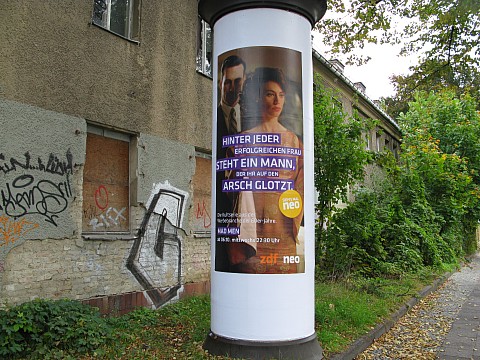
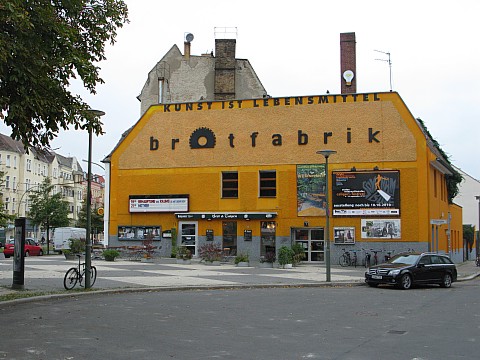
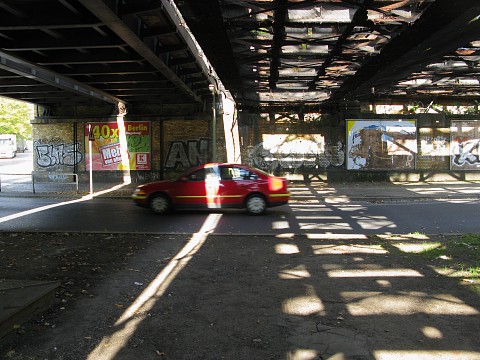

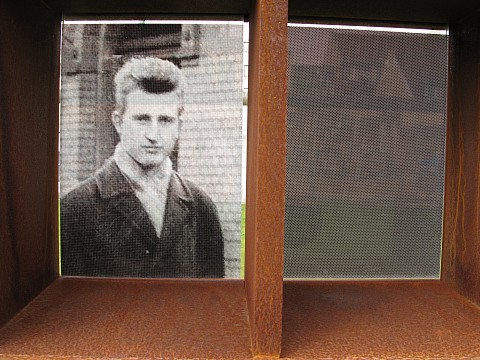
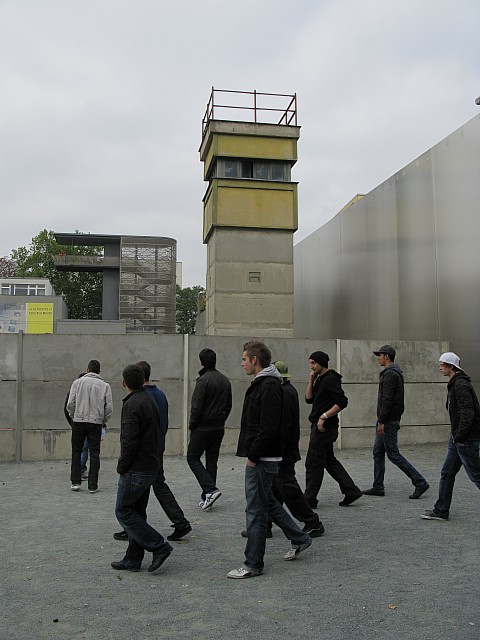



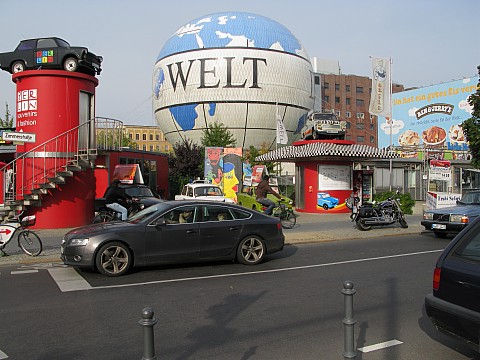


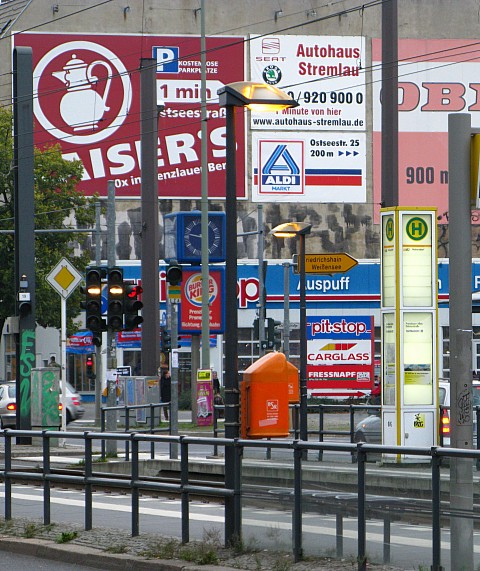
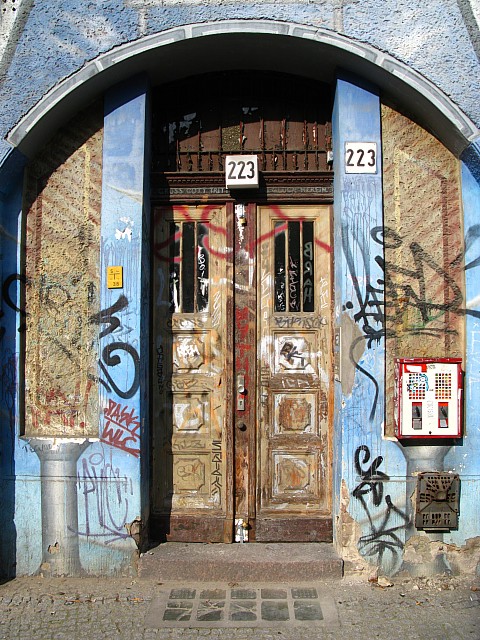
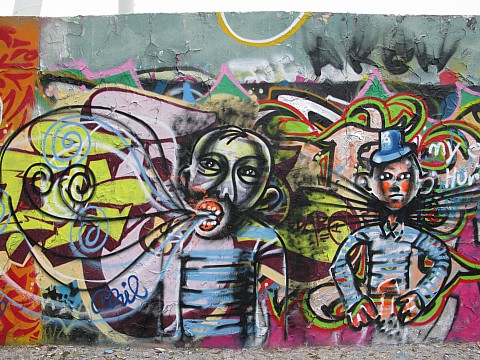
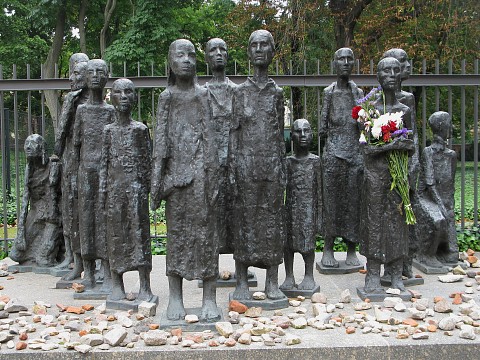
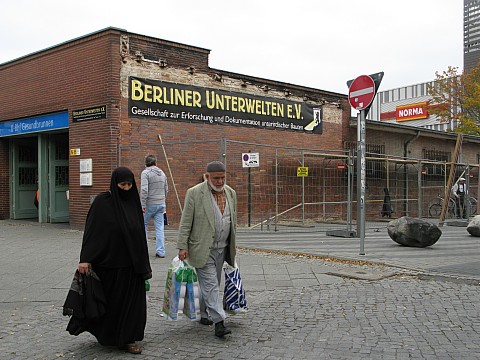
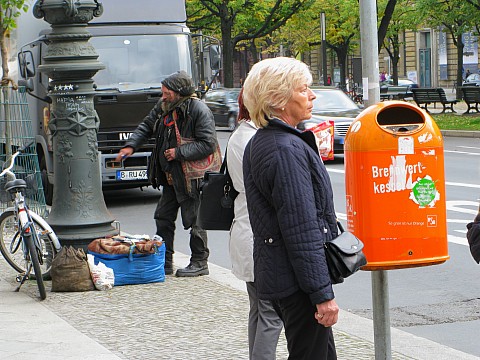
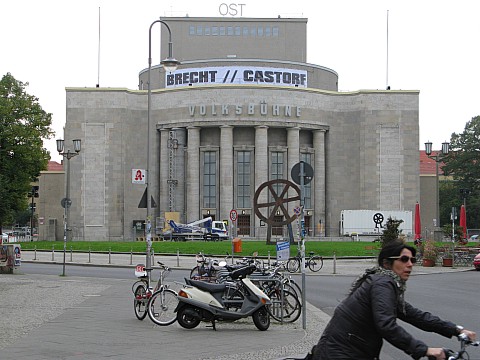
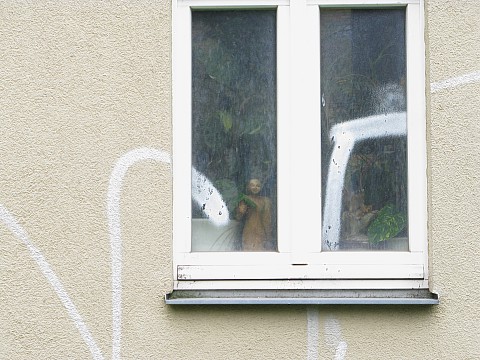

Anton K.: Pictures of a journey to Berlin, 2009
Mit ein gedicht von Paul Boldt (1885-1921)
Berlin
Die Stimmen der Autos wie Jägersignale
Die Täler der Straße bewaldend ziehn.
Schüsse von Licht. Mit einem Male
Brennen die Himmel auf Berlin.
Die Spree, ein Antlitz wie der Tag,
Das glänzend meerwärts späht nach Rettern,
Behält der wilden Stadt Geschmack,
Auf der die Züge krächzend klettern.
Die blaue Nacht fließt in der Forst.
Sie fühlt, geblendet, daß du lebst.
Schnellzüge steigen aus dem Horst!
Der weiße Abend, den du webst,
Fühlt, blüht, verblättert in das All.
Ein Menschenhände-Fangen treibst du
Um den verklungnen Erdenball
Wie hartes Licht; und also bleibst du.
Wer weiß, in welche Welten dein
Erstarktes Sternenauge schien,
Stahlmasterblühte Stadt aus Stein,
Der Erde weiße Blume, Berlin.
Paul Boldt (1914)
fleurs du mal magazine
More in: Anton K. Photos & Observations, Boldt, Paul, FDM in Berlin, Nachrichten aus Berlin
![]()
James Joyce
(1882-1941)
Araby
North Richmond Street being blind, was a quiet street except at the hour when the Christian Brothers’ School set the boys free. An uninhabited house of two storeys stood at the blind end, detached from its neighbours in a square ground The other houses of the street, conscious of decent lives within them, gazed at one another with brown imperturbable faces.
The former tenant of our house, a priest, had died in the back drawing-room. Air, musty from having been long enclosed, hung in all the rooms, and the waste room behind the kitchen was littered with old useless papers. Among these I found a few paper-covered books, the pages of which were curled and damp: The Abbot, by Walter Scott, The Devout Communicant and The Memoirs of Vidocq. I liked the last best because its leaves were yellow. The wild garden behind the house contained a central apple-tree and a few straggling bushes under one of which I found the late tenant’s rusty bicycle-pump. He had been a very charitable priest; in his will he had left all his money to institutions and the furniture of his house to his sister.
When the short days of winter came dusk fell before we had well eaten our dinners. When we met in the street the houses had grown sombre. The space of sky above us was the colour of ever-changing violet and towards it the lamps of the street lifted their feeble lanterns. The cold air stung us and we played till our bodies glowed. Our shouts echoed in the silent street. The career of our play brought us through the dark muddy lanes behind the houses where we ran the gauntlet of the rough tribes from the cottages, to the back doors of the dark dripping gardens where odours arose from the ashpits, to the dark odorous stables where a coachman smoothed and combed the horse or shook music from the buckled harness. When we returned to the street light from the kitchen windows had filled the areas. If my uncle was seen turning the corner we hid in the shadow until we had seen him safely housed. Or if Mangan’s sister came out on the doorstep to call her brother in to his tea we watched her from our shadow peer up and down the street. We waited to see whether she would remain or go in and, if she remained, we left our shadow and walked up to Mangan’s steps resignedly. She was waiting for us, her figure defined by the light from the half-opened door. Her brother always teased her before he obeyed and I stood by the railings looking at her. Her dress swung as she moved her body and the soft rope of her hair tossed from side to side.
Every morning I lay on the floor in the front parlour watching her door. The blind was pulled down to within an inch of the sash so that I could not be seen. When she came out on the doorstep my heart leaped. I ran to the hall, seized my books and followed her. I kept her brown figure always in my eye and, when we came near the point at which our ways diverged, I quickened my pace and passed her. This happened morning after morning. I had never spoken to her, except for a few casual words, and yet her name was like a summons to all my foolish blood.
Her image accompanied me even in places the most hostile to romance. On Saturday evenings when my aunt went marketing I had to go to carry some of the parcels. We walked through the flaring streets, jostled by drunken men and bargaining women, amid the curses of labourers, the shrill litanies of shop-boys who stood on guard by the barrels of pigs’ cheeks, the nasal chanting of street-singers, who sang a come-all-you about O’Donovan Rossa, or a ballad about the troubles in our native land. These noises converged in a single sensation of life for me: I imagined that I bore my chalice safely through a throng of foes. Her name sprang to my lips at moments in strange prayers and praises which I myself did not understand. My eyes were often full of tears (I could not tell why) and at times a flood from my heart seemed to pour itself out into my bosom. I thought little of the future. I did not know whether I would ever speak to her or not or, if I spoke to her, how I could tell her of my confused adoration. But my body was like a harp and her words and gestures were like fingers running upon the wires.
One evening I went into the back drawing-room in which the priest had died. It was a dark rainy evening and there was no sound in the house. Through one of the broken panes I heard the rain impinge upon the earth, the fine incessant needles of water playing in the sodden beds. Some distant lamp or lighted window gleamed below me. I was thankful that I could see so little. All my senses seemed to desire to veil themselves and, feeling that I was about to slip from them, I pressed the palms of my hands together until they trembled, murmuring: “O love! O love!” many times.
At last she spoke to me. When she addressed the first words to me I was so confused that I did not know what to answer. She asked me was I going to Araby. I forgot whether I answered yes or no. It would be a splendid bazaar, she said she would love to go.
“And why can’t you?” I asked.
While she spoke she turned a silver bracelet round and round her wrist. She could not go, she said, because there would be a retreat that week in her convent. Her brother and two other boys were fighting for their caps and I was alone at the railings. She held one of the spikes, bowing her head towards me. The light from the lamp opposite our door caught the white curve of her neck, lit up her hair that rested there and, falling, lit up the hand upon the railing. It fell over one side of her dress and caught the white border of a petticoat, just visible as she stood at ease.
“It’s well for you,” she said.
“If I go,” I said, “I will bring you something.”
What innumerable follies laid waste my waking and sleeping thoughts after that evening! I wished to annihilate the tedious intervening days. I chafed against the work of school. At night in my bedroom and by day in the classroom her image came between me and the page I strove to read. The syllables of the word Araby were called to me through the silence in which my soul luxuriated and cast an Eastern enchantment over me. I asked for leave to go to the bazaar on Saturday night. My aunt was surprised and hoped it was not some Freemason affair. I answered few questions in class. I watched my master’s face pass from amiability to sternness; he hoped I was not beginning to idle. I could not call my wandering thoughts together. I had hardly any patience with the serious work of life which, now that it stood between me and my desire, seemed to me child’s play, ugly monotonous child’s play.
On Saturday morning I reminded my uncle that I wished to go to the bazaar in the evening. He was fussing at the hallstand, looking for the hat-brush, and answered me curtly:
“Yes, boy, I know.”
As he was in the hall I could not go into the front parlour and lie at the window. I left the house in bad humour and walked slowly towards the school. The air was pitilessly raw and already my heart misgave me.
When I came home to dinner my uncle had not yet been home. Still it was early. I sat staring at the clock for some time and. when its ticking began to irritate me, I left the room. I mounted the staircase and gained the upper part of the house. The high cold empty gloomy rooms liberated me and I went from room to room singing. From the front window I saw my companions playing below in the street. Their cries reached me weakened and indistinct and, leaning my forehead against the cool glass, I looked over at the dark house where she lived. I may have stood there for an hour, seeing nothing but the brown-clad figure cast by my imagination, touched discreetly by the lamplight at the curved neck, at the hand upon the railings and at the border below the dress.
When I came downstairs again I found Mrs. Mercer sitting at the fire. She was an old garrulous woman, a pawnbroker’s widow, who collected used stamps for some pious purpose. I had to endure the gossip of the tea-table. The meal was prolonged beyond an hour and still my uncle did not come. Mrs. Mercer stood up to go: she was sorry she couldn’t wait any longer, but it was after eight o’clock and she did not like to be out late as the night air was bad for her. When she had gone I began to walk up and down the room, clenching my fists. My aunt said:
“I’m afraid you may put off your bazaar for this night of Our Lord.”
At nine o’clock I heard my uncle’s latchkey in the halldoor. I heard him talking to himself and heard the hallstand rocking when it had received the weight of his overcoat. I could interpret these signs. When he was midway through his dinner I asked him to give me the money to go to the bazaar. He had forgotten.
“The people are in bed and after their first sleep now,” he said.
I did not smile. My aunt said to him energetically:
“Can’t you give him the money and let him go? You’ve kept him late enough as it is.”
My uncle said he was very sorry he had forgotten. He said he believed in the old saying: “All work and no play makes Jack a dull boy.” He asked me where I was going and, when I had told him a second time he asked me did I know The Arab’s Farewell to his Steed. When I left the kitchen he was about to recite the opening lines of the piece to my aunt.
I held a florin tightly in my hand as I strode down Buckingham Street towards the station. The sight of the streets thronged with buyers and glaring with gas recalled to me the purpose of my journey. I took my seat in a third-class carriage of a deserted train. After an intolerable delay the train moved out of the station slowly. It crept onward among ruinous houses and over the twinkling river. At Westland Row Station a crowd of people pressed to the carriage doors; but the porters moved them back, saying that it was a special train for the bazaar. I remained alone in the bare carriage. In a few minutes the train drew up beside an improvised wooden platform. I passed out on to the road and saw by the lighted dial of a clock that it was ten minutes to ten. In front of me was a large building which displayed the magical name.
I could not find any sixpenny entrance and, fearing that the bazaar would be closed, I passed in quickly through a turnstile, handing a shilling to a weary-looking man. I found myself in a big hall girdled at half its height by a gallery. Nearly all the stalls were closed and the greater part of the hall was in darkness. I recognised a silence like that which pervades a church after a service. I walked into the centre of the bazaar timidly. A few people were gathered about the stalls which were still open. Before a curtain, over which the words Café Chantant were written in coloured lamps, two men were counting money on a salver. I listened to the fall of the coins.
Remembering with difficulty why I had come I went over to one of the stalls and examined porcelain vases and flowered tea-sets. At the door of the stall a young lady was talking and laughing with two young gentlemen. I remarked their English accents and listened vaguely to their conversation.
“O, I never said such a thing!”
“O, but you did!”
“O, but I didn’t!”
“Didn’t she say that?”
“Yes. I heard her.”
“O, there’s a . . . fib!”
Observing me the young lady came over and asked me did I wish to buy anything. The tone of her voice was not encouraging; she seemed to have spoken to me out of a sense of duty. I looked humbly at the great jars that stood like eastern guards at either side of the dark entrance to the stall and murmured:
“No, thank you.”
The young lady changed the position of one of the vases and went back to the two young men. They began to talk of the same subject. Once or twice the young lady glanced at me over her shoulder.
I lingered before her stall, though I knew my stay was useless, to make my interest in her wares seem the more real. Then I turned away slowly and walked down the middle of the bazaar. I allowed the two pennies to fall against the sixpence in my pocket. I heard a voice call from one end of the gallery that the light was out. The upper part of the hall was now completely dark.
Gazing up into the darkness I saw myself as a creature driven and derided by vanity; and my eyes burned with anguish and anger.
James Joyce stories
fleursdumal.nl magazine
More in: Joyce, James, Joyce, James
James Joyce
(1882-1941)
Clay
The matron had given her leave to go out as soon as the women’s tea was over and Maria looked forward to her evening out. The kitchen was spick and span: the cook said you could see yourself in the big copper boilers. The fire was nice and bright and on one of the side-tables were four very big barmbracks. These barmbracks seemed uncut; but if you went closer you would see that they had been cut into long thick even slices and were ready to be handed round at tea. Maria had cut them herself.
Maria was a very, very small person indeed but she had a very long nose and a very long chin. She talked a little through her nose, always soothingly: “Yes, my dear,” and “No, my dear.” She was always sent for when the women quarrelled Over their tubs and always succeeded in making peace. One day the matron had said to her:
“Maria, you are a veritable peace-maker!”
And the sub-matron and two of the Board ladies had heard the compliment. And Ginger Mooney was always saying what she wouldn’t do to the dummy who had charge of the irons if it wasn’t for Maria. Everyone was so fond of Maria.
The women would have their tea at six o’clock and she would be able to get away before seven. From Ballsbridge to the Pillar, twenty minutes; from the Pillar to Drumcondra, twenty minutes; and twenty minutes to buy the things. She would be there before eight. She took out her purse with the silver clasps and read again the words A Present from Belfast. She was very fond of that purse because Joe had brought it to her five years before when he and Alphy had gone to Belfast on a Whit-Monday trip. In the purse were two half-crowns and some coppers. She would have five shillings clear after paying tram fare. What a nice evening they would have, all the children singing! Only she hoped that Joe wouldn’t come in drunk. He was so different when he took any drink.
Often he had wanted her to go and live with them;-but she would have felt herself in the way (though Joe’s wife was ever so nice with her) and she had become accustomed to the life of the laundry. Joe was a good fellow. She had nursed him and Alphy too; and Joe used often say:
“Mamma is mamma but Maria is my proper mother.”
After the break-up at home the boys had got her that position in the Dublin by Lamplight laundry, and she liked it. She used to have such a bad opinion of Protestants but now she thought they were very nice people, a little quiet and serious, but still very nice people to live with. Then she had her plants in the conservatory and she liked looking after them. She had lovely ferns and wax-plants and, whenever anyone came to visit her, she always gave the visitor one or two slips from her conservatory. There was one thing she didn’t like and that was the tracts on the walks; but the matron was such a nice person to deal with, so genteel.
When the cook told her everything was ready she went into the women’s room and began to pull the big bell. In a few minutes the women began to come in by twos and threes, wiping their steaming hands in their petticoats and pulling down the sleeves of their blouses over their red steaming arms. They settled down before their huge mugs which the cook and the dummy filled up with hot tea, already mixed with milk and sugar in huge tin cans. Maria superintended the distribution of the barmbrack and saw that every woman got her four slices. There was a great deal of laughing and joking during the meal. Lizzie Fleming said Maria was sure to get the ring and, though Fleming had said that for so many Hallow Eves, Maria had to laugh and say she didn’t want any ring or man either; and when she laughed her grey-green eyes sparkled with disappointed shyness and the tip of her nose nearly met the tip of her chin. Then Ginger Mooney lifted her mug of tea and proposed Maria’s health while all the other women clattered with their mugs on the table, and said she was sorry she hadn’t a sup of porter to drink it in. And Maria laughed again till the tip of her nose nearly met the tip of her chin and till her minute body nearly shook itself asunder because she knew that Mooney meant well though, of course, she had the notions of a common woman.
But wasn’t Maria glad when the women had finished their tea and the cook and the dummy had begun to clear away the tea- things! She went into her little bedroom and, remembering that the next morning was a mass morning, changed the hand of the alarm from seven to six. Then she took off her working skirt and her house-boots and laid her best skirt out on the bed and her tiny dress-boots beside the foot of the bed. She changed her blouse too and, as she stood before the mirror, she thought of how she used to dress for mass on Sunday morning when she was a young girl; and she looked with quaint affection at the diminutive body which she had so often adorned, In spite of its years she found it a nice tidy little body.
When she got outside the streets were shining with rain and she was glad of her old brown waterproof. The tram was full and she had to sit on the little stool at the end of the car, facing all the people, with her toes barely touching the floor. She arranged in her mind all she was going to do and thought how much better it was to be independent and to have your own money in your pocket. She hoped they would have a nice evening. She was sure they would but she could not help thinking what a pity it was Alphy and Joe were not speaking. They were always falling out now but when they were boys together they used to be the best of friends: but such was life.
She got out of her tram at the Pillar and ferreted her way quickly among the crowds. She went into Downes’s cake-shop but the shop was so full of people that it was a long time before she could get herself attended to. She bought a dozen of mixed penny cakes, and at last came out of the shop laden with a big bag. Then she thought what else would she buy: she wanted to buy something really nice. They would be sure to have plenty of apples and nuts. It was hard to know what to buy and all she could think of was cake. She decided to buy some plumcake but Downes’s plumcake had not enough almond icing on top of it so she went over to a shop in Henry Street. Here she was a long time in suiting herself and the stylish young lady behind the counter, who was evidently a little annoyed by her, asked her was it wedding-cake she wanted to buy. That made Maria blush and smile at the young lady; but the young lady took it all very seriously and finally cut a thick slice of plumcake, parcelled it up and said:
“Two-and-four, please.”
She thought she would have to stand in the Drumcondra tram because none of the young men seemed to notice her but an elderly gentleman made room for her. He was a stout gentleman and he wore a brown hard hat; he had a square red face and a greyish moustache. Maria thought he was a colonel-looking gentleman and she reflected how much more polite he was than the young men who simply stared straight before them. The gentleman began to chat with her about Hallow Eve and the rainy weather. He supposed the bag was full of good things for the little ones and said it was only right that the youngsters should enjoy themselves while they were young. Maria agreed with him and favoured him with demure nods and hems. He was very nice with her, and when she was getting out at the Canal Bridge she thanked him and bowed, and he bowed to her and raised his hat and smiled agreeably, and while she was going up along the terrace, bending her tiny head under the rain, she thought how easy it was to know a gentleman even when he has a drop taken.
Everybody said: “0, here’s Maria!” when she came to Joe’s house. Joe was there, having come home from business, and all the children had their Sunday dresses on. There were two big girls in from next door and games were going on. Maria gave the bag of cakes to the eldest boy, Alphy, to divide and Mrs. Donnelly said it was too good of her to bring such a big bag of cakes and made all the children say:
“Thanks, Maria.”
But Maria said she had brought something special for papa and mamma, something they would be sure to like, and she began to look for her plumcake. She tried in Downes’s bag and then in the pockets of her waterproof and then on the hallstand but nowhere could she find it. Then she asked all the children had any of them eaten it — by mistake, of course — but the children all said no and looked as if they did not like to eat cakes if they were to be accused of stealing. Everybody had a solution for the mystery and Mrs. Donnelly said it was plain that Maria had left it behind her in the tram. Maria, remembering how confused the gentleman with the greyish moustache had made her, coloured with shame and vexation and disappointment. At the thought of the failure of her little surprise and of the two and fourpence she had thrown away for nothing she nearly cried outright.
But Joe said it didn’t matter and made her sit down by the fire. He was very nice with her. He told her all that went on in his office, repeating for her a smart answer which he had made to the manager. Maria did not understand why Joe laughed so much over the answer he had made but she said that the manager must have been a very overbearing person to deal with. Joe said he wasn’t so bad when you knew how to take him, that he was a decent sort so long as you didn’t rub him the wrong way. Mrs. Donnelly played the piano for the children and they danced and sang. Then the two next-door girls handed round the nuts. Nobody could find the nutcrackers and Joe was nearly getting cross over it and asked how did they expect Maria to crack nuts without a nutcracker. But Maria said she didn’t like nuts and that they weren’t to bother about her. Then Joe asked would she take a bottle of stout and Mrs. Donnelly said there was port wine too in the house if she would prefer that. Maria said she would rather they didn’t ask her to take anything: but Joe insisted.
So Maria let him have his way and they sat by the fire talking over old times and Maria thought she would put in a good word for Alphy. But Joe cried that God might strike him stone dead if ever he spoke a word to his brother again and Maria said she was sorry she had mentioned the matter. Mrs. Donnelly told her husband it was a great shame for him to speak that way of his own flesh and blood but Joe said that Alphy was no brother of his and there was nearly being a row on the head of it. But Joe said he would not lose his temper on account of the night it was and asked his wife to open some more stout. The two next-door girls had arranged some Hallow Eve games and soon everything was merry again. Maria was delighted to see the children so merry and Joe and his wife in such good spirits. The next-door girls put some saucers on the table and then led the children up to the table, blindfold. One got the prayer-book and the other three got the water; and when one of the next-door girls got the ring Mrs. Donnelly shook her finger at the blushing girl as much as to say: 0, I know all about it! They insisted then on blindfolding Maria and leading her up to the table to see what she would get; and, while they were putting on the bandage, Maria laughed and laughed again till the tip of her nose nearly met the tip of her chin.
They led her up to the table amid laughing and joking and she put her hand out in the air as she was told to do. She moved her hand about here and there in the air and descended on one of the saucers. She felt a soft wet substance with her fingers and was surprised that nobody spoke or took off her bandage. There was a pause for a few seconds; and then a great deal of scuffling and whispering. Somebody said something about the garden, and at last Mrs. Donnelly said something very cross to one of the next-door girls and told her to throw it out at once: that was no play. Maria understood that it was wrong that time and so she had to do it over again: and this time she got the prayer-book.
After that Mrs. Donnelly played Miss McCloud’s Reel for the children and Joe made Maria take a glass of wine. Soon they were all quite merry again and Mrs. Donnelly said Maria would enter a convent before the year was out because she had got the prayer-book. Maria had never seen Joe so nice to her as he was that night, so full of pleasant talk and reminiscences. She said they were all very good to her.
At last the children grew tired and sleepy and Joe asked Maria would she not sing some little song before she went, one of the old songs. Mrs. Donnelly said “Do, please, Maria!” and so Maria had to get up and stand beside the piano. Mrs. Donnelly bade the children be quiet and listen to Maria’s song. Then she played the prelude and said “Now, Maria!” and Maria, blushing very much began to sing in a tiny quavering voice. She sang I Dreamt that I Dwelt, and when she came to the second verse she sang again:
I dreamt that I dwelt in marble halls With vassals and serfs at my side, And of all who assembled within those walls That I was the hope and the pride.
I had riches too great to count; could boast Of a high ancestral name, But I also dreamt, which pleased me most, That you loved me still the same.
But no one tried to show her her mistake; and when she had ended her song Joe was very much moved. He said that there was no time like the long ago and no music for him like poor old Balfe, whatever other people might say; and his eyes filled up so much with tears that he could not find what he was looking for and in the end he had to ask his wife to tell him where the corkscrew was.
James Joyce stories
kempis.nl poetry magazine
More in: Joyce, James, Joyce, James
James Joyce
(1882-1941)
After The Race
The cars came scudding in towards Dublin, running evenly like pellets in the groove of the Naas Road. At the crest of the hill at Inchicore sightseers had gathered in clumps to watch the cars careering homeward and through this channel of poverty and inaction the Continent sped its wealth and industry. Now and again the clumps of people raised the cheer of the gratefully oppressed. Their sympathy, however, was for the blue cars, the cars of their friends, the French.
The French, moreover, were virtual victors. Their team had finished solidly; they had been placed second and third and the driver of the winning German car was reported a Belgian. Each blue car, therefore, received a double measure of welcome as it topped the crest of the hill and each cheer of welcome was acknowledged with smiles and nods by those in the car. In one of these trimly built cars was a party of four young men whose spirits seemed to be at present well above the level of successful Gallicism: in fact, these four young men were almost hilarious. They were Charles Segouin, the owner of the car; Andre Riviere, a young electrician of Canadian birth; a huge Hungarian named Villona and a neatly groomed young man named Doyle. Segouin was in good humour because he had unexpectedly received some orders in advance (he was about to start a motor establishment in Paris) and Riviere was in good humour because he was to be appointed manager of the establishment; these two young men (who were cousins) were also in good humour because of the success of the French cars. Villona was in good humour because he had had a very satisfactory luncheon; and besides he was an optimist by nature. The fourth member of the party, however, was too excited to be genuinely happy.
He was about twenty-six years of age, with a soft, light brown moustache and rather innocent-looking grey eyes. His father, who had begun life as an advanced Nationalist, had modified his views early. He had made his money as a butcher in Kingstown and by opening shops in Dublin and in the suburbs he had made his money many times over. He had also been fortunate enough to secure some of the police contracts and in the end he had become rich enough to be alluded to in the Dublin newspapers as a merchant prince. He had sent his son to England to be educated in a big Catholic college and had afterwards sent him to Dublin University to study law. Jimmy did not study very earnestly and took to bad courses for a while. He had money and he was popular; and he divided his time curiously between musical and motoring circles. Then he had been sent for a term to Cambridge to see a little life. His father, remonstrative, but covertly proud of the excess, had paid his bills and brought him home. It was at Cambridge that he had met Segouin. They were not much more than acquaintances as yet but Jimmy found great pleasure in the society of one who had seen so much of the world and was reputed to own some of the biggest hotels in France. Such a person (as his father agreed) was well worth knowing, even if he had not been the charming companion he was. Villona was entertaining also, a brilliant pianist, but, unfortunately, very poor.
The car ran on merrily with its cargo of hilarious youth. The two cousins sat on the front seat; Jimmy and his Hungarian friend sat behind. Decidedly Villona was in excellent spirits; he kept up a deep bass hum of melody for miles of the road The Frenchmen flung their laughter and light words over their shoulders and often Jimmy had to strain forward to catch the quick phrase. This was not altogether pleasant for him, as he had nearly always to make a deft guess at the meaning and shout back a suitable answer in the face of a high wind. Besides Villona’s humming would confuse anybody; the noise of the car, too.
Rapid motion through space elates one; so does notoriety; so does the possession of money. These were three good reasons for Jimmy’s excitement. He had been seen by many of his friends that day in the company of these Continentals. At the control Segouin had presented him to one of the French competitors and, in answer to his confused murmur of compliment, the swarthy face of the driver had disclosed a line of shining white teeth. It was pleasant after that honour to return to the profane world of spectators amid nudges and significant looks. Then as to money, he really had a great sum under his control. Segouin, perhaps, would not think it a great sum but Jimmy who, in spite of temporary errors, was at heart the inheritor of solid instincts knew well with what difficulty it had been got together. This knowledge had previously kept his bills within the limits of reasonable recklessness, and if he had been so conscious of the labour latent in money when there had been question merely of some freak of the higher intelligence, how much more so now when he was about to stake the greater part of his substance! It was a serious thing for him.
Of course, the investment was a good one and Segouin had managed to give the impression that it was by a favour of friendship the mite of Irish money was to be included in the capital of the concern. Jimmy had a respect for his father’s shrewdness in business matters and in this case it had been his father who had first suggested the investment; money to be made in the motor business, pots of money. Moreover Segouin had the unmistakable air of wealth. Jimmy set out to translate into days’ work that lordly car in which he sat. How smoothly it ran. In what style they had come careering along the country roads! The journey laid a magical finger on the genuine pulse of life and gallantly the machinery of human nerves strove to answer the bounding courses of the swift blue animal.
They drove down Dame Street. The street was busy with unusual traffic, loud with the horns of motorists and the gongs of impatient tram-drivers. Near the Bank Segouin drew up and Jimmy and his friend alighted. A little knot of people collected on the footpath to pay homage to the snorting motor. The party was to dine together that evening in Segouin’s hotel and, meanwhile, Jimmy and his friend, who was staying with him, were to go home to dress. The car steered out slowly for Grafton Street while the two young men pushed their way through the knot of gazers. They walked northward with a curious feeling of disappointment in the exercise, while the city hung its pale globes of light above them in a haze of summer evening.
In Jimmy’s house this dinner had been pronounced an occasion. A certain pride mingled with his parents’ trepidation, a certain eagerness, also, to play fast and loose for the names of great foreign cities have at least this virtue. Jimmy, too, looked very well when he was dressed and, as he stood in the hall giving a last equation to the bows of his dress tie, his father may have felt even commercially satisfied at having secured for his son qualities often unpurchaseable. His father, therefore, was unusually friendly with Villona and his manner expressed a real respect for foreign accomplishments; but this subtlety of his host was probably lost upon the Hungarian, who was beginning to have a sharp desire for his dinner.
The dinner was excellent, exquisite. Segouin, Jimmy decided, had a very refined taste. The party was increased by a young Englishman named Routh whom Jimmy had seen with Segouin at Cambridge. The young men supped in a snug room lit by electric candle lamps. They talked volubly and with little reserve. Jimmy, whose imagination was kindling, conceived the lively youth of the Frenchmen twined elegantly upon the firm framework of the Englishman’s manner. A graceful image of his, he thought, and a just one. He admired the dexterity with which their host directed the conversation. The five young men had various tastes and their tongues had been loosened. Villona, with immense respect, began to discover to the mildly surprised Englishman the beauties of the English madrigal, deploring the loss of old instruments. Riviere, not wholly ingenuously, undertook to explain to Jimmy the triumph of the French mechanicians. The resonant voice of the Hungarian was about to prevail in ridicule of the spurious lutes of the romantic painters when Segouin shepherded his party into politics. Here was congenial ground for all. Jimmy, under generous influences, felt the buried zeal of his father wake to life within him: he aroused the torpid Routh at last. The room grew doubly hot and Segouin’s task grew harder each moment: there was even danger of personal spite. The alert host at an opportunity lifted his glass to Humanity and, when the toast had been drunk, he threw open a window significantly.
That night the city wore the mask of a capital. The five young men strolled along Stephen’s Green in a faint cloud of aromatic smoke. They talked loudly and gaily and their cloaks dangled from their shoulders. The people made way for them. At the corner of Grafton Street a short fat man was putting two handsome ladies on a car in charge of another fat man. The car drove off and the short fat man caught sight of the party.
“Andre.”
“It’s Farley!”
A torrent of talk followed. Farley was an American. No one knew very well what the talk was about. Villona and Riviere were the noisiest, but all the men were excited. They got up on a car, squeezing themselves together amid much laughter. They drove by the crowd, blended now into soft colours, to a music of merry bells. They took the train at Westland Row and in a few seconds, as it seemed to Jimmy, they were walking out of Kingstown Station. The ticket-collector saluted Jimmy; he was an old man:
“Fine night, sir!”
It was a serene summer night; the harbour lay like a darkened mirror at their feet. They proceeded towards it with linked arms, singing Cadet Roussel in chorus, stamping their feet at every:
“Ho! Ho! Hohe, vraiment!”
They got into a rowboat at the slip and made out for the American’s yacht. There was to be supper, music, cards. Villona said with conviction:
“It is delightful!”
There was a yacht piano in the cabin. Villona played a waltz for Farley and Riviere, Farley acting as cavalier and Riviere as lady. Then an impromptu square dance, the men devising original figures. What merriment! Jimmy took his part with a will; this was seeing life, at least. Then Farley got out of breath and cried “Stop!” A man brought in a light supper, and the young men sat down to it for form’s sake. They drank, however: it was Bohemian. They drank Ireland, England, France, Hungary, the United States of America. Jimmy made a speech, a long speech, Villona saying: “Hear! hear!” whenever there was a pause. There was a great clapping of hands when he sat down. It must have been a good speech. Farley clapped him on the back and laughed loudly. What jovial fellows! What good company they were!
Cards! cards! The table was cleared. Villona returned quietly to his piano and played voluntaries for them. The other men played game after game, flinging themselves boldly into the adventure. They drank the health of the Queen of Hearts and of the Queen of Diamonds. Jimmy felt obscurely the lack of an audience: the wit was flashing. Play ran very high and paper began to pass. Jimmy did not know exactly who was winning but he knew that he was losing. But it was his own fault for he frequently mistook his cards and the other men had to calculate his I.O.U.’s for him. They were devils of fellows but he wished they would stop: it was getting late. Someone gave the toast of the yacht The Belle of Newport and then someone proposed one great game for a finish.
The piano had stopped; Villona must have gone up on deck. It was a terrible game. They stopped just before the end of it to drink for luck. Jimmy understood that the game lay between Routh and Segouin. What excitement! Jimmy was excited too; he would lose, of course. How much had he written away? The men rose to their feet to play the last tricks. talking and gesticulating. Routh won. The cabin shook with the young men’s cheering and the cards were bundled together. They began then to gather in what they had won. Farley and Jimmy were the heaviest losers.
He knew that he would regret in the morning but at present he was glad of the rest, glad of the dark stupor that would cover up his folly. He leaned his elbows on the table and rested his head between his hands, counting the beats of his temples. The cabin door opened and he saw the Hungarian standing in a shaft of grey light:
“Daybreak, gentlemen!”
James Joyce: After the race
kempis.nl poetry magazine
More in: Joyce, James, Joyce, James
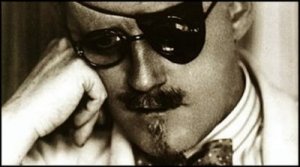
James Joyce
(1882-1941)
A Mother
Mr Holohan, assistant secretary of the Eire Abu Society, had been walking up and down Dublin for nearly a month, with his hands and pockets full of dirty pieces of paper, arranging about the series of concerts. He had a game leg and for this his friends called him Hoppy Holohan. He walked up and down constantly, stood by the hour at street corners arguing the point and made notes; but in the end it was Mrs. Kearney who arranged everything.
Miss Devlin had become Mrs. Kearney out of spite. She had been educated in a high-class convent, where she had learned French and music. As she was naturally pale and unbending in manner she made few friends at school. When she came to the age of marriage she was sent out to many houses, where her playing and ivory manners were much admired. She sat amid the chilly circle of her accomplishments, waiting for some suitor to brave it and offer her a brilliant life. But the young men whom she met were ordinary and she gave them no encouragement, trying to console her romantic desires by eating a great deal of Turkish Delight in secret. However, when she drew near the limit and her friends began to loosen their tongues about her, she silenced them by marrying Mr. Kearney, who was a bootmaker on Ormond Quay.
He was much older than she. His conversation, which was serious, took place at intervals in his great brown beard. After the first year of married life, Mrs. Kearney perceived that such a man would wear better than a romantic person, but she never put her own romantic ideas away. He was sober, thrifty and pious; he went to the altar every first Friday, sometimes with her, oftener by himself. But she never weakened in her religion and was a good wife to him. At some party in a strange house when she lifted her eyebrow ever so slightly he stood up to take his leave and, when his cough troubled him, she put the eider-down quilt over his feet and made a strong rum punch. For his part, he was a model father. By paying a small sum every week into a society, he ensured for both his daughters a dowry of one hundred pounds each when they came to the age of twenty-four. He sent the older daughter, Kathleen, to a good convent, where she learned French and music, and afterward paid her fees at the Academy. Every year in the month of July Mrs. Kearney found occasion to say to some friend:
“My good man is packing us off to Skerries for a few weeks.”
If it was not Skerries it was Howth or Greystones.
When the Irish Revival began to be appreciable Mrs. Kearney determined to take advantage of her daughter’s name and brought an Irish teacher to the house. Kathleen and her sister sent Irish picture postcards to their friends and these friends sent back other Irish picture postcards. On special Sundays, when Mr. Kearney went with his family to the pro-cathedral, a little crowd of people would assemble after mass at the corner of Cathedral Street. They were all friends of the Kearneys, musical friends or Nationalist friends; and, when they had played every little counter of gossip, they shook hands with one another all together, laughing at the crossing of so many hands, and said good-bye to one another in Irish. Soon the name of Miss Kathleen Kearney began to be heard often on people’s lips. People said that she was very clever at music and a very nice girl and, moreover, that she was a believer in the language movement. Mrs. Kearney was well content at this. Therefore she was not surprised when one day Mr. Holohan came to her and proposed that her daughter should be the accompanist at a series of four grand concerts which his Society was going to give in the Antient Concert Rooms. She brought him into the drawing-room, made him sit down and brought out the decanter and the silver biscuit-barrel. She entered heart and soul into the details of the enterprise, advised and dissuaded: and finally a contract was drawn up by which Kathleen was to receive eight guineas for her services as accompanist at the four grand concerts.
As Mr. Holohan was a novice in such delicate matters as the wording of bills and the disposing of items for a programme, Mrs. Kearney helped him. She had tact. She knew what artistes should go into capitals and what artistes should go into small type. She knew that the first tenor would not like to come on after Mr. Meade’s comic turn. To keep the audience continually diverted she slipped the doubtful items in between the old favourites. Mr. Holohan called to see her every day to have her advice on some point. She was invariably friendly and advising, homely, in fact. She pushed the decanter towards him, saying:
“Now, help yourself, Mr. Holohan!”
And while he was helping himself she said:
“Don’t be afraid! Don t be afraid of it! “
Everything went on smoothly. Mrs. Kearney bought some lovely blush-pink charmeuse in Brown Thomas’s to let into the front of Kathleen’s dress. It cost a pretty penny; but there are occasions when a little expense is justifiable. She took a dozen of two-shilling tickets for the final concert and sent them to those friends who could not be trusted to come otherwise. She forgot nothing, and, thanks to her, everything that was to be done was done.
The concerts were to be on Wednesday, Thursday, Friday and Saturday. When Mrs. Kearney arrived with her daughter at the Antient Concert Rooms on Wednesday night she did not like the look of things. A few young men, wearing bright blue badges in their coats, stood idle in the vestibule; none of them wore evening dress. She passed by with her daughter and a quick glance through the open door of the hall showed her the cause of the stewards’ idleness. At first she wondered had she mistaken the hour. No, it was twenty minutes to eight.
In the dressing-room behind the stage she was introduced to the secretary of the Society, Mr. Fitzpatrick. She smiled and shook his hand. He was a little man, with a white, vacant face. She noticed that he wore his soft brown hat carelessly on the side of his head and that his accent was flat. He held a programme in his hand, and, while he was talking to her, he chewed one end of it into a moist pulp. He seemed to bear disappointments lightly. Mr. Holohan came into the dressingroom every few minutes with reports from the box-office. The artistes talked among themselves nervously, glanced from time to time at the mirror and rolled and unrolled their music. When it was nearly half-past eight, the few people in the hall began to express their desire to be entertained. Mr. Fitzpatrick came in, smiled vacantly at the room, and said:
“Well now, ladies and gentlemen. I suppose we’d better open the ball.”
Mrs. Kearney rewarded his very flat final syllable with a quick stare of contempt, and then said to her daughter encouragingly:
“Are you ready, dear?”
When she had an opportunity, she called Mr. Holohan aside and asked him to tell her what it meant. Mr. Holohan did not know what it meant. He said that the committee had made a mistake in arranging for four concerts: four was too many.
“And the artistes!” said Mrs. Kearney. “Of course they are doing their best, but really they are not good.”
Mr. Holohan admitted that the artistes were no good but the committee, he said, had decided to let the first three concerts go as they pleased and reserve all the talent for Saturday night. Mrs. Kearney said nothing, but, as the mediocre items followed one another on the platform and the few people in the hall grew fewer and fewer, she began to regret that she had put herself to any expense for such a concert. There was something she didn’t like in the look of things and Mr. Fitzpatrick’s vacant smile irritated her very much. However, she said nothing and waited to see how it would end. The concert expired shortly before ten, and everyone went home quickly.
The concert on Thursday night was better attended, but Mrs. Kearney saw at once that the house was filled with paper. The audience behaved indecorously, as if the concert were an informal dress rehearsal. Mr. Fitzpatrick seemed to enjoy himself; he was quite unconscious that Mrs. Kearney was taking angry note of his conduct. He stood at the edge of the screen, from time to time jutting out his head and exchanging a laugh with two friends in the corner of the balcony. In the course of the evening, Mrs. Kearney learned that the Friday concert was to be abandoned and that the committee was going to move heaven and earth to secure a bumper house on Saturday night. When she heard this, she sought out Mr. Holohan. She buttonholed him as he was limping out quickly with a glass of lemonade for a young lady and asked him was it true. Yes. it was true.
“But, of course, that doesn’t alter the contract,” she said. “The contract was for four concerts.”
Mr. Holohan seemed to be in a hurry; he advised her to speak to Mr. Fitzpatrick. Mrs. Kearney was now beginning to be alarmed. She called Mr. Fitzpatrick away from his screen and told him that her daughter had signed for four concerts and that, of course, according to the terms of the contract, she should receive the sum originally stipulated for, whether the society gave the four concerts or not. Mr. Fitzpatrick, who did not catch the point at issue very quickly, seemed unable to resolve the difficulty and said that he would bring the matter before the committee. Mrs. Kearney’s anger began to flutter in her cheek and she had all she could do to keep from asking:
“And who is the Cometty pray?”
But she knew that it would not be ladylike to do that: so she was silent.
Little boys were sent out into the principal streets of Dublin early on Friday morning with bundles of handbills. Special puffs appeared in all the evening papers, reminding the music loving public of the treat which was in store for it on the following evening. Mrs. Kearney was somewhat reassured, but be thought well to tell her husband part of her suspicions. He listened carefully and said that perhaps it would be better if he went with her on Saturday night. She agreed. She respected her husband in the same way as she respected the General Post Office, as something large, secure and fixed; and though she knew the small number of his talents she appreciated his abstract value as a male. She was glad that he had suggested coming with her. She thought her plans over.
The night of the grand concert came. Mrs. Kearney, with her husband and daughter, arrived at the Ancient Concert Rooms three-quarters of an hour before the time at which the concert was to begin. By ill luck it was a rainy evening. Mrs. Kearney placed her daughter’s clothes and music in charge of her husband and went all over the building looking for Mr. Holohan or Mr. Fitzpatrick. She could find neither. She asked the stewards was any member of the committee in the hall and, after a great deal of trouble, a steward brought out a little woman named Miss Beirne to whom Mrs. Kearney explained that she wanted to see one of the secretaries. Miss Beirne expected them any minute and asked could she do anything. Mrs. Kearney looked searchingly at the oldish face which was screwed into an expression of trustfulness and enthusiasm and answered:
“No, thank you!”
The little woman hoped they would have a good house. She looked out at the rain until the melancholy of the wet street effaced all the trustfulness and enthusiasm from her twisted features. Then she gave a little sigh and said:
“Ah, well! We did our best, the dear knows.”
Mrs. Kearney had to go back to the dressing-room.
The artistes were arriving. The bass and the second tenor had already come. The bass, Mr. Duggan, was a slender young man with a scattered black moustache. He was the son of a hall porter in an office in the city and, as a boy, he had sung prolonged bass notes in the resounding hall. From this humble state he had raised himself until he had become a first-rate artiste. He had appeared in grand opera. One night, when an operatic artiste had fallen ill, he had undertaken the part of the king in the opera of Maritana at the Queen’s Theatre. He sang his music with great feeling and volume and was warmly welcomed by the gallery; but, unfortunately, he marred the good impression by wiping his nose in his gloved hand once or twice out of thoughtlessness. He was unassuming and spoke little. He said yous so softly that it passed unnoticed and he never drank anything stronger than milk for his voice’s sake. Mr. Bell, the second tenor, was a fair-haired little man who competed every year for prizes at the Feis Ceoil. On his fourth trial he had been awarded a bronze medal. He was extremely nervous and extremely jealous of other tenors and he covered his nervous jealousy with an ebullient friendliness. It was his humour to have people know what an ordeal a concert was to him. Therefore when he saw Mr. Duggan he went over to him and asked:
“Are you in it too? “
“Yes,” said Mr. Duggan.
Mr. Bell laughed at his fellow-sufferer, held out his hand and said:
“Shake!”
Mrs. Kearney passed by these two young men and went to the edge of the screen to view the house. The seats were being filled up rapidly and a pleasant noise circulated in the auditorium. She came back and spoke to her husband privately. Their conversation was evidently about Kathleen for they both glanced at her often as she stood chatting to one of her Nationalist friends, Miss Healy, the contralto. An unknown solitary woman with a pale face walked through the room. The women followed with keen eyes the faded blue dress which was stretched upon a meagre body. Someone said that she was Madam Glynn, the soprano.
“I wonder where did they dig her up,” said Kathleen to Miss Healy. “I’m sure I never heard of her.”
Miss Healy had to smile. Mr. Holohan limped into the dressing-room at that moment and the two young ladies asked him who was the unknown woman. Mr. Holohan said that she was Madam Glynn from London. Madam Glynn took her stand in a corner of the room, holding a roll of music stiffly before her and from time to time changing the direction of her startled gaze. The shadow took her faded dress into shelter but fell revengefully into the little cup behind her collar-bone. The noise of the hall became more audible. The first tenor and the baritone arrived together. They were both well dressed, stout and complacent and they brought a breath of opulence among the company.
Mrs. Kearney brought her daughter over to them, and talked to them amiably. She wanted to be on good terms with them but, while she strove to be polite, her eyes followed Mr. Holohan in his limping and devious courses. As soon as she could she excused herself and went out after him.
“Mr. Holohan, I want to speak to you for a moment,” she said.
They went down to a discreet part of the corridor. Mrs Kearney asked him when was her daughter going to be paid. Mr. Holohan said that Mr. Fitzpatrick had charge of that. Mrs. Kearney said that she didn’t know anything about Mr. Fitzpatrick. Her daughter had signed a contract for eight guineas and she would have to be paid. Mr. Holohan said that it wasn’t his business.
“Why isn’t it your business?” asked Mrs. Kearney. “Didn’t you yourself bring her the contract? Anyway, if it’s not your business it’s my business and I mean to see to it.”
“You’d better speak to Mr. Fitzpatrick,” said Mr. Holohan distantly.
“I don’t know anything about Mr. Fitzpatrick,” repeated Mrs. Kearney. “I have my contract, and I intend to see that it is carried out.”
When she came back to the dressing-room her cheeks were slightly suffused. The room was lively. Two men in outdoor dress had taken possession of the fireplace and were chatting familiarly with Miss Healy and the baritone. They were the Freeman man and Mr. O’Madden Burke. The Freeman man had come in to say that he could not wait for the concert as he had to report the lecture which an American priest was giving in the Mansion House. He said they were to leave the report for him at the Freeman office and he would see that it went in. He was a grey-haired man, with a plausible voice and careful manners. He held an extinguished cigar in his hand and the aroma of cigar smoke floated near him. He had not intended to stay a moment because concerts and artistes bored him considerably but he remained leaning against the mantelpiece. Miss Healy stood in front of him, talking and laughing. He was old enough to suspect one reason for her politeness but young enough in spirit to turn the moment to account. The warmth, fragrance and colour of her body appealed to his senses. He was pleasantly conscious that the bosom which he saw rise and fall slowly beneath him rose and fell at that moment for him, that the laughter and fragrance and wilful glances were his tribute. When he could stay no longer he took leave of her regretfully.
“O’Madden Burke will write the notice,” he explained to Mr. Holohan, “and I’ll see it in.”
“Thank you very much, Mr. Hendrick,” said Mr. Holohan, “you’ll see it in, I know. Now, won’t you have a little something before you go?”
“I don’t mind,” said Mr. Hendrick.
The two men went along some tortuous passages and up a dark staircase and came to a secluded room where one of the stewards was uncorking bottles for a few gentlemen. One of these gentlemen was Mr. O’Madden Burke, who had found out the room by instinct. He was a suave, elderly man who balanced his imposing body, when at rest, upon a large silk umbrella. His magniloquent western name was the moral umbrella upon which he balanced the fine problem of his finances. He was widely respected.
While Mr. Holohan was entertaining the Freeman man Mrs. Kearney was speaking so animatedly to her husband that he had to ask her to lower her voice. The conversation of the others in the dressing-room had become strained. Mr. Bell, the first item, stood ready with his music but the accompanist made no sign. Evidently something was wrong. Mr. Kearney looked straight before him, stroking his beard, while Mrs. Kearney spoke into Kathleen’s ear with subdued emphasis. From the hall came sounds of encouragement, clapping and stamping of feet. The first tenor and the baritone and Miss Healy stood together, waiting tranquilly, but Mr. Bell’s nerves were greatly agitated because he was afraid the audience would think that he had come late.
Mr. Holohan and Mr. O’Madden Burke came into the room In a moment Mr. Holohan perceived the hush. He went over to Mrs. Kearney and spoke with her earnestly. While they were speaking the noise in the hall grew louder. Mr. Holohan became very red and excited. He spoke volubly, but Mrs. Kearney said curtly at intervals:
“She won’t go on. She must get her eight guineas.”
Mr. Holohan pointed desperately towards the hall where the audience was clapping and stamping. He appealed to Mr Kearney and to Kathleen. But Mr. Kearney continued to stroke his beard and Kathleen looked down, moving the point of her new shoe: it was not her fault. Mrs. Kearney repeated:
“She won’t go on without her money.”
After a swift struggle of tongues Mr. Holohan hobbled out in haste. The room was silent. When the strain of the silence had become somewhat painful Miss Healy said to the baritone:
“Have you seen Mrs. Pat Campbell this week?”
The baritone had not seen her but he had been told that she was very fine. The conversation went no further. The first tenor bent his head and began to count the links of the gold chain which was extended across his waist, smiling and humming random notes to observe the effect on the frontal sinus. From time to time everyone glanced at Mrs. Kearney.
The noise in the auditorium had risen to a clamour when Mr. Fitzpatrick burst into the room, followed by Mr. Holohan who was panting. The clapping and stamping in the hall were punctuated by whistling. Mr. Fitzpatrick held a few banknotes in his hand. He counted out four into Mrs. Kearney’s hand and said she would get the other half at the interval. Mrs. Kearney said:
“This is four shillings short.”
But Kathleen gathered in her skirt and said: “Now. Mr. Bell,” to the first item, who was shaking like an aspen. The singer and the accompanist went out together. The noise in hall died away. There was a pause of a few seconds: and then the piano was heard.
The first part of the concert was very successful except for Madam Glynn’s item. The poor lady sang Killarney in a bodiless gasping voice, with all the old-fashioned mannerisms of intonation and pronunciation which she believed lent elegance to her singing. She looked as if she had been resurrected from an old stage-wardrobe and the cheaper parts of the hall made fun of her high wailing notes. The first tenor and the contralto, however, brought down the house. Kathleen played a selection of Irish airs which was generously applauded. The first part closed with a stirring patriotic recitation delivered by a young lady who arranged amateur theatricals. It was deservedly applauded; and, when it was ended, the men went out for the interval, content.
All this time the dressing-room was a hive of excitement. In one corner were Mr. Holohan, Mr. Fitzpatrick, Miss Beirne, two of the stewards, the baritone, the bass, and Mr. O’Madden Burke. Mr. O’Madden Burke said it was the most scandalous exhibition he had ever witnessed. Miss Kathleen Kearney’s musical career was ended in Dublin after that, he said. The baritone was asked what did he think of Mrs. Kearney’s conduct. He did not like to say anything. He had been paid his money and wished to be at peace with men. However, he said that Mrs. Kearney might have taken the artistes into consideration. The stewards and the secretaries debated hotly as to what should be done when the interval came.
“I agree with Miss Beirne,” said Mr. O’Madden Burke. “Pay her nothing.”
In another corner of the room were Mrs. Kearney and he: husband, Mr. Bell, Miss Healy and the young lady who had to recite the patriotic piece. Mrs. Kearney said that the Committee had treated her scandalously. She had spared neither trouble nor expense and this was how she was repaid.
They thought they had only a girl to deal with and that therefore, they could ride roughshod over her. But she would show them their mistake. They wouldn’t have dared to have treated her like that if she had been a man. But she would see that her daughter got her rights: she wouldn’t be fooled. If they didn’t pay her to the last farthing she would make Dublin ring. Of course she was sorry for the sake of the artistes. But what else could she do? She appealed to the second tenor who said he thought she had not been well treated. Then she appealed to Miss Healy. Miss Healy wanted to join the other group but she did not like to do so because she was a great friend of Kathleen’s and the Kearneys had often invited her to their house.
As soon as the first part was ended Mr. Fitzpatrick and Mr. Holohan went over to Mrs. Kearney and told her that the other four guineas would be paid after the committee meeting on the following Tuesday and that, in case her daughter did not play for the second part, the committee would consider the contract broken and would pay nothing.
“I haven’t seen any committee,” said Mrs. Kearney angrily. “My daughter has her contract. She will get four pounds eight into her hand or a foot she won’t put on that platform.”
“I’m surprised at you, Mrs. Kearney,” said Mr. Holohan. “I never thought you would treat us this way.”
“And what way did you treat me?” asked Mrs. Kearney.
Her face was inundated with an angry colour and she looked as if she would attack someone with her hands.
“I’m asking for my rights.” she said.
You might have some sense of decency,” said Mr. Holohan.
“Might I, indeed? . . . And when I ask when my daughter is going to be paid I can’t get a civil answer.”
She tossed her head and assumed a haughty voice:
“You must speak to the secretary. It’s not my business. I’m a great fellow fol-the-diddle-I-do.”
“I thought you were a lady,” said Mr. Holohan, walking away from her abruptly.
After that Mrs. Kearney’s conduct was condemned on all hands: everyone approved of what the committee had done. She stood at the door, haggard with rage, arguing with her husband and daughter, gesticulating with them. She waited until it was time for the second part to begin in the hope that the secretaries would approach her. But Miss Healy had kindly consented to play one or two accompaniments. Mrs. Kearney had to stand aside to allow the baritone and his accompanist to pass up to the platform. She stood still for an instant like an angry stone image and, when the first notes of the song struck her ear, she caught up her daughter’s cloak and said to her husband:
“Get a cab!”
He went out at once. Mrs. Kearney wrapped the cloak round her daughter and followed him. As she passed through the doorway she stopped and glared into Mr. Holohan’s face.
“I’m not done with you yet,” she said.
“But I’m done with you,” said Mr. Holohan.
Kathleen followed her mother meekly. Mr. Holohan began to pace up and down the room, in order to cool himself for he his skin on fire.
“That’s a nice lady!” he said. “O, she’s a nice lady!”
“You did the proper thing, Holohan,” said Mr. O’Madden Burke, poised upon his umbrella in approval.
James Joyce: A Mother
kempis.nl poetry magazine
More in: Archive I-J, Joyce, James, Joyce, James
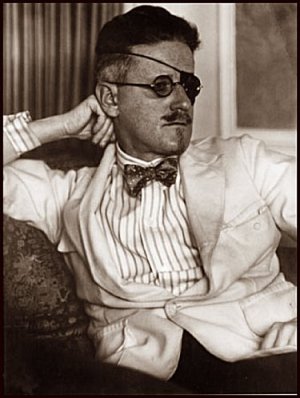
James Joyce
(1882-1941)
An Encounter
It was Joe Dillon who introduced the Wild West to us. He had a little library made up of old numbers of The Union Jack , Pluck and The Halfpenny Marvel . Every evening after school we met in his back garden and arranged Indian battles. He and his fat young brother Leo, the idler, held the loft of the stable while we tried to carry it by storm; or we fought a pitched battle on the grass. But, however well we fought, we never won siege or battle and all our bouts ended with Joe Dillon’s war dance of victory. His parents went to eight-o’clock mass every morning in Gardiner Street and the peaceful odour of Mrs. Dillon was prevalent in the hall of the house. But he played too fiercely for us who were younger and more timid. He looked like some kind of an Indian when he capered round the garden, an old tea-cosy on his head, beating a tin with his fist and yelling:
“Ya! yaka, yaka, yaka!”
Everyone was incredulous when it was reported that he had a vocation for the priesthood. Nevertheless it was true.
A spirit of unruliness diffused itself among us and, under its influence, differences of culture and constitution were waived. We banded ourselves together, some boldly, some in jest and some almost in fear: and of the number of these latter, the reluctant Indians who were afraid to seem studious or lacking in robustness, I was one. The adventures related in the literature of the Wild West were remote from my nature but, at least, they opened doors of escape. I liked better some American detective stories which were traversed from time to time by unkempt fierce and beautiful girls. Though there was nothing wrong in these stories and though their intention was sometimes literary they were circulated secretly at school. One day when Father Butler was hearing the four pages of Roman History clumsy Leo Dillon was discovered with a copy of The Halfpenny Marvel.
“This page or this page? This page Now, Dillon, up! ‘Hardly had the day’ . . . Go on! What day? ‘Hardly had the day dawned’ . . . Have you studied it? What have you there in your pocket?”
Everyone’s heart palpitated as Leo Dillon handed up the paper and everyone assumed an innocent face. Father Butler turned over the pages, frowning.
“What is this rubbish?” he said. “The Apache Chief! Is this what you read instead of studying your Roman History? Let me not find any more of this wretched stuff in this college. The man who wrote it, I suppose, was some wretched fellow who writes these things for a drink. I’m surprised at boys like you, educated, reading such stuff. I could understand it if you were . . . National School boys. Now, Dillon, I advise you strongly, get at your work or . . . ”
This rebuke during the sober hours of school paled much of the glory of the Wild West for me and the confused puffy face of Leo Dillon awakened one of my consciences. But when the restraining influence of the school was at a distance I began to hunger again for wild sensations, for the escape which those chronicles of disorder alone seemed to offer me. The mimic warfare of the evening became at last as wearisome to me as the routine of school in the morning because I wanted real adventures to happen to myself. But real adventures, I reflected, do not happen to people who remain at home: they must be sought abroad.
The summer holidays were near at hand when I made up my mind to break out of the weariness of schoollife for one day at least. With Leo Dillon and a boy named Mahony I planned a day’s miching. Each of us saved up sixpence. We were to meet at ten in the morning on the Canal Bridge. Mahony’s big sister was to write an excuse for him and Leo Dillon was to tell his brother to say he was sick. We arranged to go along the Wharf Road until we came to the ships, then to cross in the ferryboat and walk out to see the Pigeon House. Leo Dillon was afraid we might meet Father Butler or someone out of the college; but Mahony asked, very sensibly, what would Father Butler be doing out at the Pigeon House. We were reassured: and I brought the first stage of the plot to an end by collecting sixpence from the other two, at the same time showing them my own sixpence. When we were making the last arrangements on the eve we were all vaguely excited. We shook hands, laughing, and Mahony said:
“Till tomorrow, mates!”
That night I slept badly. In the morning I was firstcomer to the bridge as I lived nearest. I hid my books in the long grass near the ashpit at the end of the garden where nobody ever came and hurried along the canal bank. It was a mild sunny morning in the first week of June. I sat up on the coping of the bridge admiring my frail canvas shoes which I had diligently pipeclayed overnight and watching the docile horses pulling a tramload of business people up the hill. All the branches of the tall trees which lined the mall were gay with little light green leaves and the sunlight slanted through them on to the water. The granite stone of the bridge was beginning to be warm and I began to pat it with my hands in time to an air in my head. I was very happy.
When I had been sitting there for five or ten minutes I saw Mahony’s grey suit approaching. He came up the hill, smiling, and clambered up beside me on the bridge. While we were waiting he brought out the catapult which bulged from his inner pocket and explained some improvements which he had made in it. I asked him why he had brought it and he told me he had brought it to have some gas with the birds. Mahony used slang freely, and spoke of Father Butler as Old Bunser. We waited on for a quarter of an hour more but still there was no sign of Leo Dillon. Mahony, at last, jumped down and said:
“Come along. I knew Fatty’d funk it.”
“And his sixpence . . . ?” I said.
“That’s forfeit,” said Mahony. “And so much the better for us, a bob and a tanner instead of a bob.”
We walked along the North Strand Road till we came to the Vitriol Works and then turned to the right along the Wharf Road. Mahony began to play the Indian as soon as we were out of public sight. He chased a crowd of ragged girls, brandishing his unloaded catapult and, when two ragged boys began, out of chivalry, to fling stones at us, he proposed that we should charge them. I objected that the boys were too small and so we walked on, the ragged troop screaming after us: “Swaddlers! Swaddlers!” thinking that we were Protestants because Mahony, who was dark-complexioned, wore the silver badge of a cricket club in his cap. When we came to the Smoothing Iron we arranged a siege; but it was a failure because you must have at least three. We revenged ourselves on Leo Dillon by saying what a funk he was and guessing how many he would get at three o’clock from Mr. Ryan.
We came then near the river. We spent a long time walking about the noisy streets flanked by high stone walls, watching the working of cranes and engines and often being shouted at for our immobility by the drivers of groaning carts. It was noon when we reached the quays and as all the labourers seemed to be eating their lunches, we bought two big currant buns and sat down to eat them on some metal piping beside the river. We pleased ourselves with the spectacle of Dublin’s commerce, the barges signalled from far away by their curls of woolly smoke, the brown fishing fleet beyond Ringsend, the big white sailing-vessel which was being discharged on the opposite quay. Mahony said it would be right skit to run away to sea on one of those big ships and even I, looking at the high masts, saw, or imagined, the geography which had been scantily dosed to me at school gradually taking substance under my eyes. School and home seemed to recede from us and their influences upon us seemed to wane.
We crossed the Liffey in the ferryboat, paying our toll to be transported in the company of two labourers and a little Jew with a bag. We were serious to the point of solemnity, but once during the short voyage our eyes met and we laughed. When we landed we watched the discharging of the graceful three-master which we had observed from the other quay. Some bystander said that she was a Norwegian vessel. I went to the stern and tried to decipher the legend upon it but, failing to do so, I came back and examined the foreign sailors to see had any of them green eyes for I had some confused notion. . . . The sailors’ eyes were blue and grey and even black. The only sailor whose eyes could have been called green was a tall man who amused the crowd on the quay by calling out cheerfully every time the planks fell:
“All right! All right!”
When we were tired of this sight we wandered slowly into Ringsend. The day had grown sultry, and in the windows of the grocers’ shops musty biscuits lay bleaching. We bought some biscuits and chocolate which we ate sedulously as we wandered through the squalid streets where the families of the fishermen live. We could find no dairy and so we went into a huckster’s shop and bought a bottle of raspberry lemonade each. Refreshed by this, Mahony chased a cat down a lane, but the cat escaped into a wide field. We both felt rather tired and when we reached the field we made at once for a sloping bank over the ridge of which we could see the Dodder.
It was too late and we were too tired to carry out our project of visiting the Pigeon House. We had to be home before four o’clock lest our adventure should be discovered. Mahony looked regretfully at his catapult and I had to suggest going home by train before he regained any cheerfulness. The sun went in behind some clouds and left us to our jaded thoughts and the crumbs of our provisions.
There was nobody but ourselves in the field. When we had lain on the bank for some time without speaking I saw a man approaching from the far end of the field. I watched him lazily as I chewed one of those green stems on which girls tell fortunes. He came along by the bank slowly. He walked with one hand upon his hip and in the other hand he held a stick with which he tapped the turf lightly. He was shabbily dressed in a suit of greenish-black and wore what we used to call a jerry hat with a high crown. He seemed to be fairly old for his moustache was ashen-grey. When he passed at our feet he glanced up at us quickly and then continued his way. We followed him with our eyes and saw that when he had gone on for perhaps fifty paces he turned about and began to retrace his steps. He walked towards us very slowly, always tapping the ground with his stick, so slowly that I thought he was looking for something in the grass.
He stopped when he came level with us and bade us goodday. We answered him and he sat down beside us on the slope slowly and with great care. He began to talk of the weather, saying that it would be a very hot summer and adding that the seasons had changed gready since he was a boy, a long time ago. He said that the happiest time of one’s life was undoubtedly one’s schoolboy days and that he would give anything to be young again. While he expressed these sentiments which bored us a little we kept silent. Then he began to talk of school and of books. He asked us whether we had read the poetry of Thomas Moore or the works of Sir Walter Scott and Lord Lytton. I pretended that I had read every book he mentioned so that in the end he said:
“Ah, I can see you are a bookworm like myself. Now,” he added, pointing to Mahony who was regarding us with open eyes, “he is different; he goes in for games.”
He said he had all Sir Walter Scott’s works and all Lord Lytton’s works at home and never tired of reading them. “Of course,” he said, “there were some of Lord Lytton’s works which boys couldn’t read.” Mahony asked why couldn’t boys read them, a question which agitated and pained me because I was afraid the man would think I was as stupid as Mahony. The man, however, only smiled. I saw that he had great gaps in his mouth between his yellow teeth. Then he asked us which of us had the most sweethearts. Mahony mentioned lightly that he had three totties. The man asked me how many I had. I answered that I had none. He did not believe me and said he was sure I must have one. I was silent.
“Tell us,” said Mahony pertly to the man, “how many have you yourself?”
The man smiled as before and said that when he was our age he had lots of sweethearts.
“Every boy,” he said, “has a little sweetheart.”
His attitude on this point struck me as strangely liberal in a man of his age. In my heart I thought that what he said about boys and sweethearts was reasonable. But I disliked the words in his mouth and I wondered why he shivered once or twice as if he feared something or felt a sudden chill. As he proceeded I noticed that his accent was good. He began to speak to us about girls, saying what nice soft hair they had and how soft their hands were and how all girls were not so good as they seemed to be if one only knew. There was nothing he liked, he said, so much as looking at a nice young girl, at her nice white hands and her beautiful soft hair. He gave me the impression that he was repeating something which he had learned by heart or that, magnetised by some words of his own speech, his mind was slowly circling round and round in the same orbit. At times he spoke as if he were simply alluding to some fact that everybody knew, and at times he lowered his voice and spoke mysteriously as if he were telling us something secret which he did not wish others to overhear. He repeated his phrases over and over again, varying them and surrounding them with his monotonous voice. I continued to gaze towards the foot of the slope, listening to him.
After a long while his monologue paused. He stood up slowly, saying that he had to leave us for a minute or so, a few minutes, and, without changing the direction of my gaze, I saw him walking slowly away from us towards the near end of the field. We remained silent when he had gone. After a silence of a few minutes I heard Mahony exclaim:
“I say! Look what he’s doing!”
As I neither answered nor raised my eyes Mahony exclaimed again:
“I say . . . He’s a queer old josser!”
“In case he asks us for our names,” I said “let you be Murphy and I’ll be Smith.”
We said nothing further to each other. I was still considering whether I would go away or not when the man came back and sat down beside us again. Hardly had he sat down when Mahony, catching sight of the cat which had escaped him, sprang up and pursued her across the field. The man and I watched the chase. The cat escaped once more and Mahony began to throw stones at the wall she had escaladed. Desisting from this, he began to wander about the far end of the field, aimlessly.
After an interval the man spoke to me. He said that my friend was a very rough boy and asked did he get whipped often at school. I was going to reply indignantly that we were not National School boys to be whipped, as he called it; but I remained silent. He began to speak on the subject of chastising boys. His mind, as if magnetised again by his speech, seemed to circle slowly round and round its new centre. He said that when boys were that kind they ought to be whipped and well whipped. When a boy was rough and unruly there was nothing would do him any good but a good sound whipping. A slap on the hand or a box on the ear was no good: what he wanted was to get a nice warm whipping. I was surprised at this sentiment and involuntarily glanced up at his face. As I did so I met the gaze of a pair of bottle-green eyes peering at me from under a twitching forehead. I turned my eyes away again.
The man continued his monologue. He seemed to have forgotten his recent liberalism. He said that if ever he found a boy talking to girls or having a girl for a sweetheart he would whip him and whip him; and that would teach him not to be talking to girls. And if a boy had a girl for a sweetheart and told lies about it then he would give him such a whipping as no boy ever got in this world. He said that there was nothing in this world he would like so well as that. He described to me how he would whip such a boy as if he were unfolding some elaborate mystery. He would love that, he said, better than anything in this world; and his voice, as he led me monotonously through the mystery, grew almost affectionate and seemed to plead with me that I should understand him.
I waited till his monologue paused again. Then I stood up abruptly. Lest I should betray my agitation I delayed a few moments pretending to fix my shoe properly and then, saying that I was obliged to go, I bade him good-day. I went up the slope calmly but my heart was beating quickly with fear that he would seize me by the ankles. When I reached the top of the slope I turned round and, without looking at him, called loudly across the field:
“Murphy!”
My voice had an accent of forced bravery in it and I was ashamed of my paltry stratagem. I had to call the name again before Mahony saw me and hallooed in answer. How my heart beat as he came running across the field to me! He ran as if to bring me aid. And I was penitent; for in my heart I had always despised him a little.
James Joyce: An Encounter
kempis.nl poetry magazine
More in: Archive I-J, Joyce, James, Joyce, James
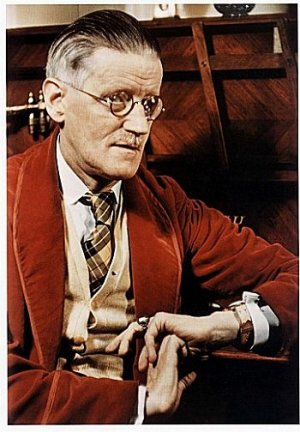
James Joyce
(1882-1941)
A Painful Case
Mr. James Duffy lived in Chapelizod because he wished to live as far as possible from the city of which he was a citizen and because he found all the other suburbs of Dublin mean, modern and pretentious. He lived in an old sombre house and from his windows he could look into the disused distillery or upwards along the shallow river on which Dublin is built. The lofty walls of his uncarpeted room were free from pictures. He had himself bought every article of furniture in the room: a black iron bedstead, an iron washstand, four cane chairs, a clothes-rack, a coal-scuttle, a fender and irons and a square table on which lay a double desk. A bookcase had been made in an alcove by means of shelves of white wood. The bed was clothed with white bedclothes and a black and scarlet rug covered the foot. A little hand-mirror hung above the washstand and during the day a white-shaded lamp stood as the sole ornament of the mantelpiece. The books on the white wooden shelves were arranged from below upwards according to bulk. A complete Wordsworth stood at one end of the lowest shelf and a copy of the Maynooth Catechism, sewn into the cloth cover of a notebook, stood at one end of the top shelf. Writing materials were always on the desk. In the desk lay a manuscript translation of Hauptmann’s Michael Kramer, the stage directions of which were written in purple ink, and a little sheaf of papers held together by a brass pin. In these sheets a sentence was inscribed from time to time and, in an ironical moment, the headline of an advertisement for Bile Beans had been pasted on to the first sheet. On lifting the lid of the desk a faint fragrance escaped, the fragrance of new cedarwood pencils or of a bottle of gum or of an overripe apple which might have been left there and forgotten.
Mr. Duffy abhorred anything which betokened physical or mental disorder. A medival doctor would have called him saturnine. His face, which carried the entire tale of his years, was of the brown tint of Dublin streets. On his long and rather large head grew dry black hair and a tawny moustache did not quite cover an unamiable mouth. His cheekbones also gave his face a harsh character; but there was no harshness in the eyes which, looking at the world from under their tawny eyebrows, gave the impression of a man ever alert to greet a redeeming instinct in others but often disappointed. He lived at a little distance from his body, regarding his own acts with doubtful side-glasses. He had an odd autobiographical habit which led him to compose in his mind from time to time a short sentence about himself containing a subject in the third person and a predicate in the past tense. He never gave alms to beggars and walked firmly, carrying a stout hazel.
He had been for many years cashier of a private bank in Baggot Street. Every morning he came in from Chapelizod by tram. At midday he went to Dan Burke’s and took his lunch, a bottle of lager beer and a small trayful of arrowroot biscuits. At four o’clock he was set free. He dined in an eating-house in George’s Street where he felt himself safe from the society of Dublin’s gilded youth and where there was a certain plain honesty in the bill of fare. His evenings were spent either before his landlady’s piano or roaming about the outskirts of the city. His liking for Mozart’s music brought him sometimes to an opera or a concert: these were the only dissipations of his life.
He had neither companions nor friends, church nor creed. He lived his spiritual life without any communion with others, visiting his relatives at Christmas and escorting them to the cemetery when they died. He performed these two social duties for old dignity’s sake but conceded nothing further to the conventions which regulate the civic life. He allowed himself to think that in certain circumstances he would rob his hank but, as these circumstances never arose, his life rolled out evenly, an adventureless tale.
One evening he found himself sitting beside two ladies in the Rotunda. The house, thinly peopled and silent, gave distressing prophecy of failure. The lady who sat next him looked round at the deserted house once or twice and then said:
“What a pity there is such a poor house tonight! It’s so hard on people to have to sing to empty benches.”
He took the remark as an invitation to talk. He was surprised that she seemed so little awkward. While they talked he tried to fix her permanently in his memory. When he learned that the young girl beside her was her daughter he judged her to be a year or so younger than himself. Her face, which must have been handsome, had remained intelligent. It was an oval face with strongly marked features. The eyes were very dark blue and steady. Their gaze began with a defiant note but was confused by what seemed a deliberate swoon of the pupil into the iris, revealing for an instant a temperament of great sensibility. The pupil reasserted itself quickly, this half-disclosed nature fell again under the reign of prudence, and her astrakhan jacket, moulding a bosom of a certain fullness, struck the note of defiance more definitely.
He met her again a few weeks afterwards at a concert in Earlsfort Terrace and seized the moments when her daughter’s attention was diverted to become intimate. She alluded once or twice to her husband but her tone was not such as to make the allusion a warning. Her name was Mrs. Sinico. Her husband’s great-great-grandfather had come from Leghorn. Her husband was captain of a mercantile boat plying between Dublin and Holland; and they had one child.
Meeting her a third time by accident he found courage to make an appointment. She came. This was the first of many meetings; they met always in the evening and chose the most quiet quarters for their walks together. Mr. Duffy, however, had a distaste for underhand ways and, finding that they were compelled to meet stealthily, he forced her to ask him to her house. Captain Sinico encouraged his visits, thinking that his daughter’s hand was in question. He had dismissed his wife so sincerely from his gallery of pleasures that he did not suspect that anyone else would take an interest in her. As the husband was often away and the daughter out giving music lessons Mr. Duffy had many opportunities of enjoying the lady’s society. Neither he nor she had had any such adventure before and neither was conscious of any incongruity. Little by little he entangled his thoughts with hers. He lent her books, provided her with ideas, shared his intellectual life with her. She listened to all.
Sometimes in return for his theories she gave out some fact of her own life. With almost maternal solicitude she urged him to let his nature open to the full: she became his confessor. He told her that for some time he had assisted at the meetings of an Irish Socialist Party where he had felt himself a unique figure amidst a score of sober workmen in a garret lit by an inefficient oil-lamp. When the party had divided into three sections, each under its own leader and in its own garret, he had discontinued his attendances. The workmen’s discussions, he said, were too timorous; the interest they took in the question of wages was inordinate. He felt that they were hard-featured realists and that they resented an exactitude which was the produce of a leisure not within their reach. No social revolution, he told her, would be likely to strike Dublin for some centuries.
She asked him why did he not write out his thoughts. For what, he asked her, with careful scorn. To compete with phrasemongers, incapable of thinking consecutively for sixty seconds? To submit himself to the criticisms of an obtuse middle class which entrusted its morality to policemen and its fine arts to impresarios?
He went often to her little cottage outside Dublin; often they spent their evenings alone. Little by little, as their thoughts entangled, they spoke of subjects less remote. Her companionship was like a warm soil about an exotic. Many times she allowed the dark to fall upon them, refraining from lighting the lamp. The dark discreet room, their isolation, the music that still vibrated in their ears united them. This union exalted him, wore away the rough edges of his character, emotionalised his mental life. Sometimes he caught himself listening to the sound of his own voice. He thought that in her eyes he would ascend to an angelical stature; and, as he attached the fervent nature of his companion more and more closely to him, he heard the strange impersonal voice which he recognised as his own, insisting on the soul’s incurable loneliness. We cannot give ourselves, it said: we are our own. The end of these discourses was that one night during which she had shown every sign of unusual excitement, Mrs. Sinico caught up his hand passionately and pressed it to her cheek.
Mr. Duffy was very much surprised. Her interpretation of his words disillusioned him. He did not visit her for a week, then he wrote to her asking her to meet him. As he did not wish their last interview to be troubled by the influence of their ruined confessional they meet in a little cakeshop near the Parkgate. It was cold autumn weather but in spite of the cold they wandered up and down the roads of the Park for nearly three hours. They agreed to break off their intercourse: every bond, he said, is a bond to sorrow. When they came out of the Park they walked in silence towards the tram; but here she began to tremble so violently that, fearing another collapse on her part, he bade her good-bye quickly and left her. A few days later he received a parcel containing his books and music.
Four years passed. Mr. Duffy returned to his even way of life. His room still bore witness of the orderliness of his mind. Some new pieces of music encumbered the music-stand in the lower room and on his shelves stood two volumes by Nietzsche: Thus Spake Zarathustra and The Gay Science. He wrote seldom in the sheaf of papers which lay in his desk. One of his sentences, written two months after his last interview with Mrs. Sinico, read: Love between man and man is impossible because there must not be sexual intercourse and friendship between man and woman is impossible because there must be sexual intercourse. He kept away from concerts lest he should meet her. His father died; the junior partner of the bank retired. And still every morning he went into the city by tram and every evening walked home from the city after having dined moderately in George’s Street and read the evening paper for dessert.
One evening as he was about to put a morsel of corned beef and cabbage into his mouth his hand stopped. His eyes fixed themselves on a paragraph in the evening paper which he had propped against the water-carafe. He replaced the morsel of food on his plate and read the paragraph attentively. Then he drank a glass of water, pushed his plate to one side, doubled the paper down before him between his elbows and read the paragraph over and over again. The cabbage began to deposit a cold white grease on his plate. The girl came over to him to ask was his dinner not properly cooked. He said it was very good and ate a few mouthfuls of it with difficulty. Then he paid his bill and went out.
He walked along quickly through the November twilight, his stout hazel stick striking the ground regularly, the fringe of the buff Mail peeping out of a side-pocket of his tight reefer overcoat. On the lonely road which leads from the Parkgate to Chapelizod he slackened his pace. His stick struck the ground less emphatically and his breath, issuing irregularly, almost with a sighing sound, condensed in the wintry air. When he reached his house he went up at once to his bedroom and, taking the paper from his pocket, read the paragraph again by the failing light of the window. He read it not aloud, but moving his lips as a priest does when he reads the prayers Secreto. This was the paragraph:
DEATH OF A LADY AT SYDNEY PARADE
A PAINFUL CASE
Today at the City of Dublin Hospital the Deputy Coroner (in the absence of Mr. Leverett) held an inquest on the body of Mrs. Emily Sinico, aged forty-three years, who was killed at Sydney Parade Station yesterday evening. The evidence showed that the deceased lady, while attempting to cross the line, was knocked down by the engine of the ten o’clock slow train from Kingstown, thereby sustaining injuries of the head and right side which led to her death.
James Lennon, driver of the engine, stated that he had been in the employment of the railway company for fifteen years. On hearing the guard’s whistle he set the train in motion and a second or two afterwards brought it to rest in response to loud cries. The train was going slowly.
P. Dunne, railway porter, stated that as the train was about to start he observed a woman attempting to cross the lines. He ran towards her and shouted, but, before he could reach her, she was caught by the buffer of the engine and fell to the ground.
A juror. “You saw the lady fall?”
Witness. “Yes.”
Police Sergeant Croly deposed that when he arrived he found the deceased lying on the platform apparently dead. He had the body taken to the waiting-room pending the arrival of the ambulance.
Constable 57 corroborated.
Dr. Halpin, assistant house surgeon of the City of Dublin Hospital, stated that the deceased had two lower ribs fractured and had sustained severe contusions of the right shoulder. The right side of the head had been injured in the fall. The injuries were not sufficient to have caused death in a normal person. Death, in his opinion, had been probably due to shock and sudden failure of the heart’s action.
Mr. H. B. Patterson Finlay, on behalf of the railway company, expressed his deep regret at the accident. The company had always taken every precaution to prevent people crossing the lines except by the bridges, both by placing notices in every station and by the use of patent spring gates at level crossings. The deceased had been in the habit of crossing the lines late at night from platform to platform and, in view of certain other circumstances of the case, he did not think the railway officials were to blame.
Captain Sinico, of Leoville, Sydney Parade, husband of the deceased, also gave evidence. He stated that the deceased was his wife. He was not in Dublin at the time of the accident as he had arrived only that morning from Rotterdam. They had been married for twenty-two years and had lived happily until about two years ago when his wife began to be rather intemperate in her habits.
Miss Mary Sinico said that of late her mother had been in the habit of going out at night to buy spirits. She, witness, had often tried to reason with her mother and had induced her to join a League. She was not at home until an hour after the accident. The jury returned a verdict in accordance with the medical evidence and exonerated Lennon from all blame.
The Deputy Coroner said it was a most painful case, and expressed great sympathy with Captain Sinico and his daughter. He urged on the railway company to take strong measures to prevent the possibility of similar accidents in the future. No blame attached to anyone.
Mr. Duffy raised his eyes from the paper and gazed out of his window on the cheerless evening landscape. The river lay quiet beside the empty distillery and from time to time a light appeared in some house on the Lucan road. What an end! The whole narrative of her death revolted him and it revolted him to think that he had ever spoken to her of what he held sacred. The threadbare phrases, the inane expressions of sympathy, the cautious words of a reporter won over to conceal the details of a commonplace vulgar death attacked his stomach. Not merely had she degraded herself; she had degraded him. He saw the squalid tract of her vice, miserable and malodorous. His soul’s companion! He thought of the hobbling wretches whom he had seen carrying cans and bottles to be filled by the barman. Just God, what an end! Evidently she had been unfit to live, without any strength of purpose, an easy prey to habits, one of the wrecks on which civilisation has been reared. But that she could have sunk so low! Was it possible he had deceived himself so utterly about her? He remembered her outburst of that night and interpreted it in a harsher sense than he had ever done. He had no difficulty now in approving of the course he had taken.
As the light failed and his memory began to wander he thought her hand touched his. The shock which had first attacked his stomach was now attacking his nerves. He put on his overcoat and hat quickly and went out. The cold air met him on the threshold; it crept into the sleeves of his coat. When he came to the public-house at Chapelizod Bridge he went in and ordered a hot punch.
The proprietor served him obsequiously but did not venture to talk. There were five or six workingmen in the shop discussing the value of a gentleman’s estate in County Kildare They drank at intervals from their huge pint tumblers and smoked, spitting often on the floor and sometimes dragging the sawdust over their spits with their heavy boots. Mr. Duffy sat on his stool and gazed at them, without seeing or hearing them. After a while they went out and he called for another punch. He sat a long time over it. The shop was very quiet. The proprietor sprawled on the counter reading the Herald and yawning. Now and again a tram was heard swishing along the lonely road outside.
As he sat there, living over his life with her and evoking alternately the two images in which he now conceived her, he realised that she was dead, that she had ceased to exist, that she had become a memory. He began to feel ill at ease. He asked himself what else could he have done. He could not have carried on a comedy of deception with her; he could not have lived with her openly. He had done what seemed to him best. How was he to blame? Now that she was gone he understood how lonely her life must have been, sitting night after night alone in that room. His life would be lonely too until he, too, died, ceased to exist, became a memory, if anyone remembered him.
It was after nine o’clock when he left the shop. The night was cold and gloomy. He entered the Park by the first gate and walked along under the gaunt trees. He walked through the bleak alleys where they had walked four years before. She seemed to be near him in the darkness. At moments he seemed to feel her voice touch his ear, her hand touch his. He stood still to listen. Why had he withheld life from her? Why had he sentenced her to death? He felt his moral nature falling to pieces.
When he gained the crest of the Magazine Hill he halted and looked along the river towards Dublin, the lights of which burned redly and hospitably in the cold night. He looked down the slope and, at the base, in the shadow of the wall of the Park, he saw some human figures lying. Those venal and furtive loves filled him with despair. He gnawed the rectitude of his life; he felt that he had been outcast from life’s feast. One human being had seemed to love him and he had denied her life and happiness: he had sentenced her to ignominy, a death of shame. He knew that the prostrate creatures down by the wall were watching him and wished him gone. No one wanted him; he was outcast from life’s feast. He turned his eyes to the grey gleaming river, winding along towards Dublin. Beyond the river he saw a goods train winding out of Kingsbridge Station, like a worm with a fiery head winding through the darkness, obstinately and laboriously. It passed slowly out of sight; but still he heard in his ears the laborious drone of the engine reiterating the syllables of her name.
He turned back the way he had come, the rhythm of the engine pounding in his ears. He began to doubt the reality of what memory told him. He halted under a tree and allowed the rhythm to die away. He could not feel her near him in the darkness nor her voice touch his ear. He waited for some minutes listening. He could hear nothing: the night was perfectly silent. He listened again: perfectly silent. He felt that he was alone.
James Joyce: A Painful Case
kempis.nl poetry magazine
More in: Archive I-J, Joyce, James, Joyce, James
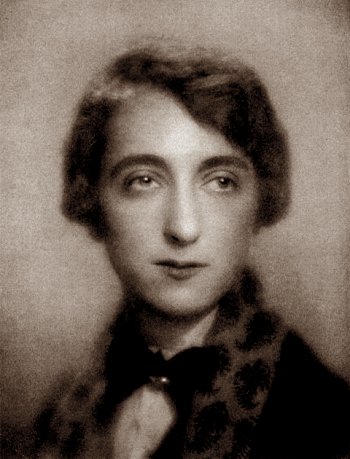
Mireille Havet
(1898-1932)
Histoire du petit cheval noir
Le petit cheval, noir comme du jais, trotte sur la route de campagne. Ses deux oreilles bien levées comme des cornets à surprise et sa queue empanachée comme un plumeau qu’agite la brise.
Il est content, le petit cheval, parce que l’air est bleu sur toute la campagne. La carriole qui sonne derrière sa croupe luisante est légère et le paysan Mathieu gai et propre dans sa blouse bleue, n’emporte jamais de fouet.
« Ah les beaux cailloux ! comme ils roulent bien sous mes quatre sabots, pense le petit cheval, et que mon estomac est agréablement rempli d’avoine. Allons, vite, vite à la ferme qui est située dans la vallée. Là, je retrouverai un petit cheval blanc que j’affectionne énormément. »
Mais voilà, que sous le lourd soleil de midi, qui est monté au fond du ciel, le gai paysan Mathieu s’est endormi. Sa bonne grosse tête est secouée de droite à gauche, de gauche à droite, par les cahots de la voiture et, devant ses yeux clos, passent des visions champêtres… La route, avant d’arriver à la ferme est raide, si raide, qu’on n’y pourrait jouer à courir sans tomber.
Mais, le petit cheval ne sait pas cela, parce qu’une main sûre, jusqu’à ce matin-là, avait toujours tenu ses guides. Et de toute la force de ses quatre jambes solides il se lance dans le sentier, avec par derrière lui, la carriole sonnante. Ah ! qu’est-il arrivé ?
Mathieu fut réveillé par une grande secousse, qui le projeta en l’air, comme une balle, et par un hennissement pitoyable. Le petit cheval noir, plié sur ses genoux de devant, était recouvert, à moitié, par la carriole qui pesait sur son dos… et il hennissait… il hennissait, parce qu’il avait mal à ses genoux écorchés.
« Ah ! pensait le petit cheval, comment faire maintenant ? j’ai si mal ! et je n’ai pas la force de me relever. J’étais si heureux de courir, avec du soleil de tous les côtés et l’air piquant dans mes naseaux ouverts. Maintenant je vais boiter comme un vieux cheval infirme. Quelle tristesse ! » Et il pleurait.
Ce n’est qu’une heure après, que Mathieu avec, d’autres garçons, purent dégager le petit cheval noir et l’aider à se relever.
Mais dans quel état ! Toute la peau de ses genoux enlevée. Ses pauvres genoux ! On le ramena à son écurie : là-haut, sur le coteau, pendant que le soleil se couchait, comme cela, avec une multitude de rayons. Le ciel ressemblait à un champ de blé.
Et le petit cheval sentait son cœur lourd comme une grosse pierre et il se disait : « Vais-je mourir ? » Mais il ne mourut pas. Ce n’était que des écorchures. On le soigna très bien. On le fit reposer et on lui donna abondamment à manger.
Cependant depuis, il n’a jamais voulu, mais jamais ! reprendre le chemin en pente qui conduit dans la vallée.
La Maison dans l’œil du chat. Paris, éditions Georges Crès & Cie, 1917
Mireille Havet poetry
kempis.nl poetry magazine
More in: Archive G-H, Havet, Mireille, Mireille Havet
Thank you for reading Fleurs du Mal - magazine for art & literature